English News
News from our English Faculty.
For more information about subjects taught by this Faculty, please see the subject page for English
To contact the English Faculty staff, please click here
Year 8 Public Speaking Competition – July 2023
A massive well done to our six Y8 Public Speaking finalists, who presented their speeches in front of the entire year group on Friday, 14th July:
Haadiya 8W
Elizah 8F
Sofia 8W
Hibba 8G
Emi 8C
Bea 8H
All six speeches were incredibly well delivered, with each students' passion, thoughtfulness, and talent well displayed. Our judges, Ms Schaber and Ms Fearon, had a very difficult time choosing a winner from such brilliant speeches, but in the end there could only be one winner.
Congratulations to Hibba 8G, for her winning speech about oppression faced by countries around the world!
Well done once again for all your hard work!
The English Faculty
Year 9 Up for Debate 2023
Congratulations to the winning debate team who won as the proposition of the motion: 'This house would ban key workers from striking.'
Opeyemi A
Noa C
Nida H
The standard was extremely high this year and we want to say well done to the runners up Isabelle F, Rodo A and Nicole B, and to the whole of Year 9 for demonstrating such great debating skills.
The English Faculty
Year 7 Windrush Freedom Walking History Tour
On Monday 12th June, 21 Year 7 students accompanied by Ms. Cato and Dr. Rose went on a Windrush Freedom Walk in sunny Walthamstow.
Our tour guide, Peter Ashan took us to local places filled with historical evidence of Walthamstow's multi- ethnic community.
Here is what some of our students said about the tour:
"I really enjoyed the trip. I learned about many things, like evidence of the slave trade in Walthamstow, and Beryl Swain the first woman to take part in a motorcycle race. I also really liked the mural about Rock Against Racism and the story behind it. Thank you!"
Humaira. S
" Interesting, exciting and historical!"
Akeelah
" I enjoyed how we explored different areas and were told the history of things. The highlight for me though, was when we saw a painting of Beryl Swain and we were told many great things about her. Another highlight was when we saw Sarah Bonell's plaque in St. Mary's Church and learned how she left money in her will to open a school for girls in the 18th century because they were not given a proper education."
Abigail
During the Windrush tour, we were showed a number of monuments located in St. Mary's Church, one of which mentioned a woman named Sarah Bonell who donated lots of money in order to build an all girls school which was unheard of at that time. The Sarah Bonell School is still around now.
Our lovely tour guide Peter Ashan was enthusiastic and made the trip all the more interesting; he also spoke to us about 'Sunday bests' where people of West Indian heritage dressed up in their best clothes to go to church on a Sunday, or to visit relatives. Whilst walking around Walthamstow, our guide led us to see a beautiful mural of the motorbike racer Beryl Swain who took part in an endurance race where she had to race around the Isle of Man in 24 hours.
Ms Schaber
Head of English
Year 8 Public Speaking Competition 2022
On Thursday, we held our annual Year 8 Public Speaking Competition in the Greek Theatre. Each form chose one student to represent their form and deliver an original speech on a topic about which they felt passionately. All the speeches were thought- provoking, eloquent, and very impressive! The judges (Ms. Careless-Pye and Ms. Schaber) were absolutely blown away by how articulate and thoughtful all the speeches were.
A massive well done to all our speech participants: Luca (8W) Marnie (8S) Eva (8F) Amelia (8G) Ulaiyah (8C) Elaaya (8H)
We're very proud to announce the winner was Eva (8F)! Her speech 'How Failure Can Lead to Success' was absolutely brilliant and delivered with confidence and conviction. We're so proud and impressed by the quality and eloquence of our students!
Well done to everyone who participated.
Ms Schaber
Head of English
Year 9 Up for Debate
Last week we held our annual Year 9 Up for Debate Grand Finals. The finalist teams had already proved themselves in two rounds of the competition; their in-class competition and a semi-final round, so we knew we were in for a brilliant Grand Final!
Both teams were incredibly eloquent, well-prepared and made their case extremely powerfully. It was a very evenly matched Grand Final and made the judge's job very difficult!
After much deliberation, we're pleased to announce that the following debate team is this year's Grand Finalist Winners:
Zahra 9W, Isobel 9F, Renee 9F
Congratulations and a massive well done to this year's winners!
Thanks,
Ms Schaber
Head of English
Year 8 English: Victorian Literature
This half-term, Year 8 have been studying Victorian Literature.
As part of this, 8H have also been delving into the world of Gothic literature and poetry.
The students have been writing their own Gothic poetry, which you will see below and hope you enjoy!
Mrs R Jolliffe
English Teacher
No-One Was There by Nafeesah
Misty and cold,
the night was as dark as death’s eye,
as I trod through the tattered park.
Caw! Caw!
A bird screeched in the distance causing my heart to stop in fear.
I felt something near,
but I couldn’t see what,
for nothing was there.
No one was there.
Tap! Tap!
Sounds of footsteps…
not belonging to me.
I screamed.
Petrified,
of what I will see.
But as I turned around,
ready to attack,
No one was there.
No one was there.
Was my mind playing a cruel trick on me?
I thought,
as I started to run far from that place.
Something felt wrong,
out of place.
My heart would not calm,
it was in a state of panic.
Somebody was there.
Somebody was there.
Somebody HAD to be there,
for I could feel their breath on my neck…
Turning around one last time,
I screamed one last time,
I saw one last time,
that nobody was there.
Nobody was there.
Apart from my corpse.
The Crow by Aiza
Into the darkness my footsteps echoed
As I met in the fog a silhouette that bellowed
“Oh No!” it said, “someone has been killed!”
My footstep quickened as my body felt a chill.
I approached the body, its hand clutching its chest
Blood pouring from the heart, his face looking possessed.
I looked around and everybody was shocked
And my eyes fell upon the thing that shot.
Beside it I saw a monstrous crow
And from the second I saw it, I knew it was a foe.
It took off with its friends
Leaving this man at his end
Murder above murder.
Reflections by Sophie
I awoke with my brain still fuzzy from mist of my dream
I saw my floor imbrued with a vermillion bloodstream
Who does it belong to? What do I do?
As I pondered whether I should follow it, my curiosity grew…
And so I gave in to my spirit of inquiry
And followed the trail that was so warped and spirally
Like a snake it contorted and slivered
I came to the end of the path; I shivered…
A mesmerising melody of trickling water sounded in my ears
Though what I thought I saw ahead of me only added to my fears,
I ignored my worries and clenched my fist,
Struggling to see, my eyes fought against the deep cloudy mist,
In front of me appeared a river like a silver ribbon, laid across the land
And then I saw it and understood the situation at hand…
The nebulous abyss of water rested elegantly
Yet there was something else in there too, it was clear to see
And then, the moon’s radiance of light illuminated what was floating inside
It was a person… and that person had died.
The crystal-clear river mirrored reflections tinted and azure blue,
But the body in the water was a reflection too…
I wanted to scream, to hide, to flee..
It was obvious the corpse in the water was Me.
Gothic Poem by Alessandra
The darkness crept whilst I slept, smothering me in the night,
Willing to go down without a fight,
I shivered and quivered up in my room,
Scared to step outside for the fear of the tomb,
That sat outside of my house,
Quaking like a mouse, holding the secrets that will bring us our doom.
The wind whistled a high tune as I looked desperately for my silver spoon,
When in the darkness without a light I shouted and I screamed with all of my might,
And in return I heard a voice,
A small voice, a quiet voice, but even so still a voice,
It called out to me,
Crying for me,
Wanting me,
But alas no one was there.
Tears slipped down my face as it reached to the lace,
That clung to my dress like a mother to its child,
I cried for the voice again, but I received nothing in return
That saddened me and though my heart did burn,
And I knew that I was finally alone,
Though for once I didn’t groan, with the knowledge that one day someone could be there.
The Stag by Matilda
He dances in my dreams ,
Prancing in my mind.
The fury in his eyes a gleam,
With acrimony unable to subside.
The hooves he wears with pride,
Crush me every time.
The terror inflicted makes me abide,
My screams seen not heard just like a mime.
His antlers prick me in my sleep,
Each drawing blood.
Enough to make me weep,
My body limp with a thud.
Ready for the dreams,
The nightmares that I can’t escape.
The ones that evoke my screams,
That wrap around me suffocating like a cape.
Will I ever be able to escape?
Gothic Poem by Anna
The mist is dank and clinging
The rain and hail is stinging
The mountains tower above
I hear footsteps nearby
And the mist goes on and on.
The mist is swirling
My heart is twirling
A wail breaks the stillness of the night
Shuddering I resist the urge to run
As I stand the wail goes on and on.
I look around in fear
And then something appears
As finally the wail stops
The science is loud
I stand my ground-the moment goes on and on.
The thing draws nearer
Its face is clearer
So terrible I’m petrified
As my head hits the floor
The night goes on and on.
Year 11 English Language Bootcamp - 7th March to 1st April
From 7th March through 1st April, all year 11 students will be participating in the English Language Bootcamp to help them prepare for their GCSE English Language exams.
The bootcamp will run during their regular English lessons. Sessions are designed to target specific strengths and areas of development to ensure all students can achieve their target grade. Students will be grouped according to target grade and achievement to date; as such, their sessions may be taught by a member of the English faculty rather than their regular English teacher.
Students will return to their regular English teacher after 1st April for continued Literature revision ahead of their GCSE exams.
Ms Schaber
Head of English
Faculties Celebrate World Book Day
Staff members from different faculties selected a genre or book and then dressed up as characters or wore symbols to represent what they had chosen.
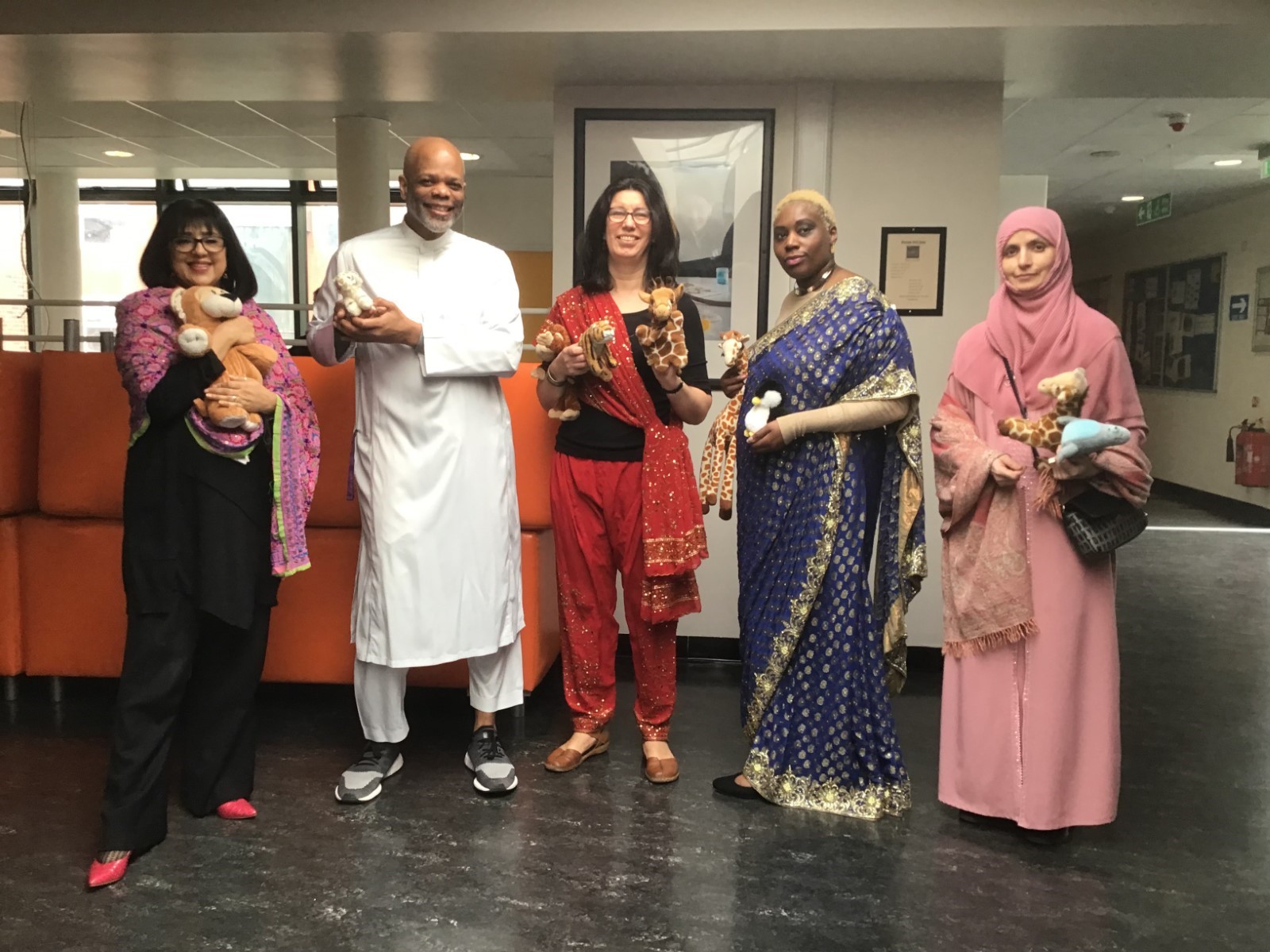
1 - Maths - Life 0f Pi
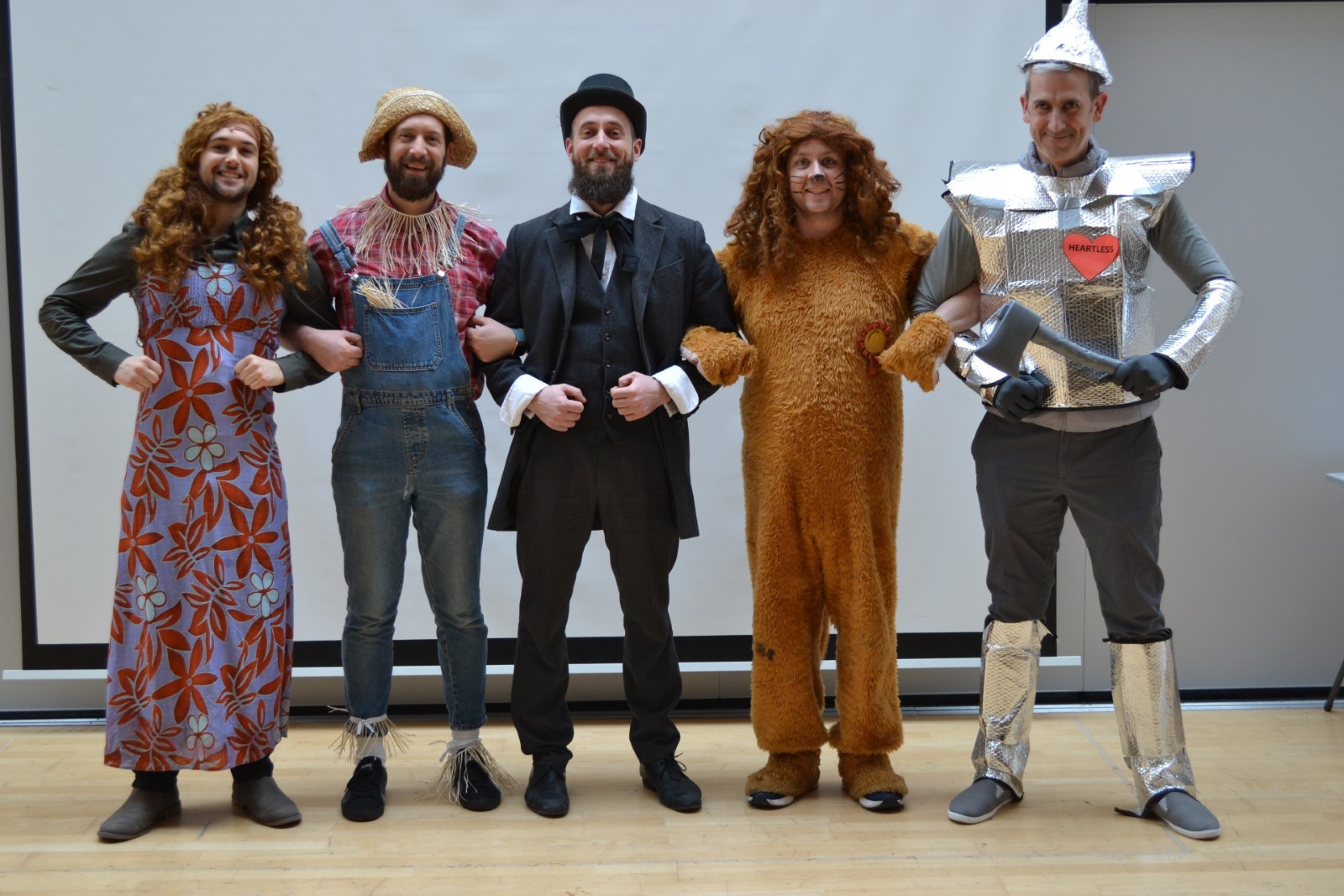
2 - Humanities - Wizard of Oz
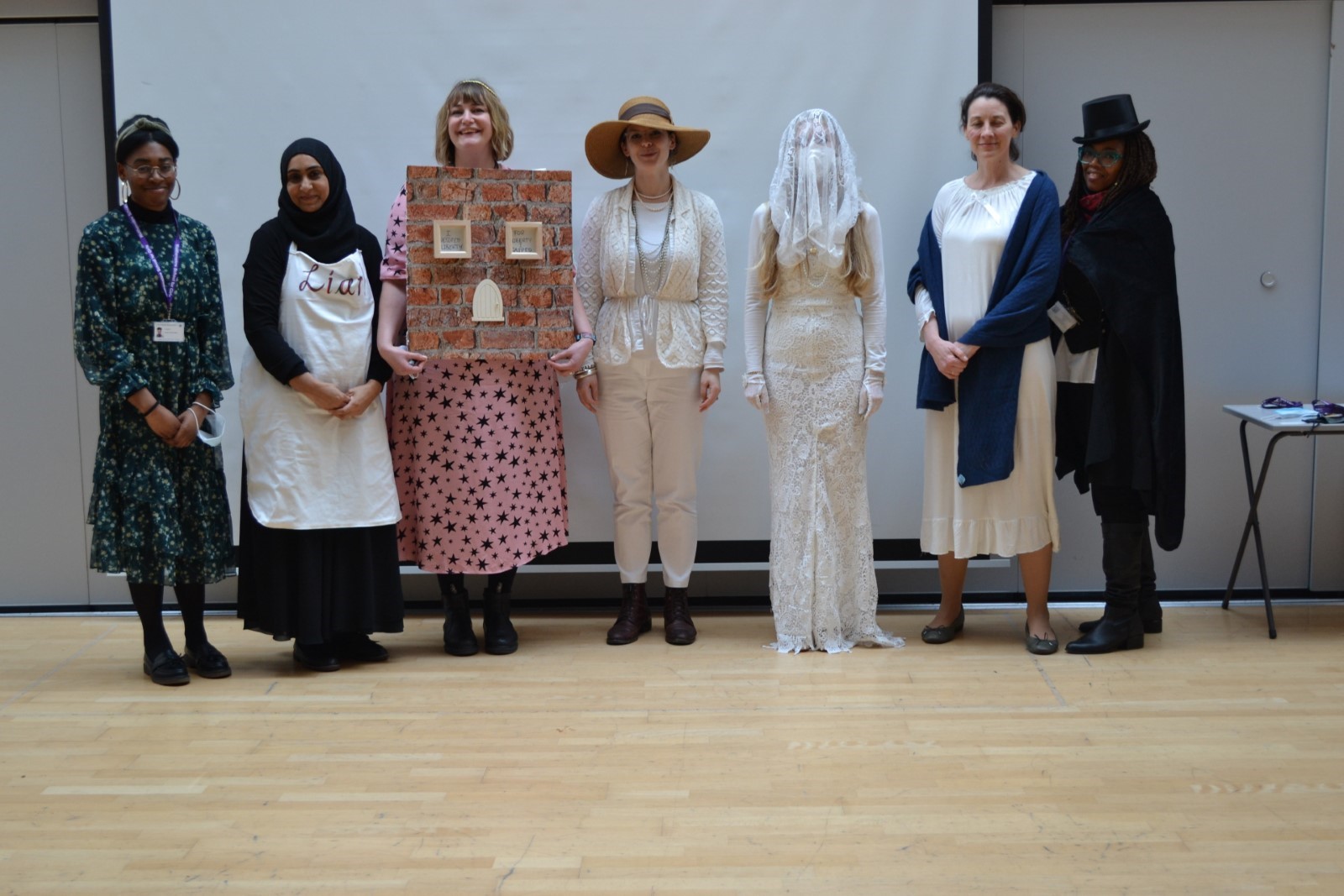
3 - English - The Victorians
Students spent the day trying to identify the genre of each faculty which hopefully generated some conversations and excitement around books and reading!
The best dressed faculty and the winning faculty chosen by the students will receive prizes next Friday when we celebrate International Women's Day.
Ms Durham
English Faculty
First-Generation Immigrant Teenager Article by Malaikah Y7

This article is about a first-generation immigrant teenager, who came to this country at the age of 16, newly married and in a foreign land, far away from her family and friends. This woman is my grandmother, my Nani (Maternal Grandmother), Abeda Vorajee and she is my inspiration. This year, in the Queen ’s New Year's Honours List, she was awarded an MBE for her services to Community Integration and Interfaith Understanding. This is her story...
Nani was born in 1956, lived in Burma and started her schooling life there at the age of 6. She was a cheeky character and loved playing with her friends, reading and climbing trees! In 1961 the country was torn by a civil war and Nani had to escape with her mother and two siblings, in the middle of the night, leaving her father and everything they owned behind. The family were reunited but life after this was much more difficult than she had ever experienced before. Despite this, she was resilient and always happy.
In 1973, Nani married my grandfather, Nana and moved to the United Kingdom, leaving her family behind.
Between then and now Nani has brought up four children, worked in education for 30 years, a foster carer for 25 years and most importantly helped nurture, inspire and advance the local community, through her dedication, commitment and tenacity.
Nani's interest in helping the community came from her love of life and the appreciation of all different kinds of people. Soon after she came to this country, she started doing Avon calling (this is a catalogue that she used to take around, door to door, which people could buy things from). Through this she met a variety of people and noticed the inequality experienced by different people, due to language barriers, gender and racial discrimination. It also led to her getting to know the community and helping those neighbours whom she realised could not speak English. My Great-Granddad, Nani's father-in-law, encouraged her to better herself by attending night classes at college. It was through his support and the remembrance and inspiration of her own father that Nani did go to college, which led her to get a job in education. She worked in schools for over 30 years and alongside this she continued with her unwavering work in the community.
In 1992 she and a few local women set up Nuneaton Muslim women’s group, a safe environment for all women and girls to go and learn different skills, experience new activities, go on day trips and take holidays together. Nani is an advocate for equality and empowerment of young girls and women and wanted to ensure their voices were heard. This is the reason she took up numerous volunteering roles within different sectors- school governor for 30 years, sitting on various council and community panels, organising interfaith activities to support community integration working with local health authorities to discourage health inequalities and organising health campaigns, specifically targeted to the local community. She has her hands in too many pies to mention them all, but she gives 100% to everything she does, whether it’s helping someone who doesn’t read or write English to fill out a form or being on an interview panel for police constable’s, ensuring a fair and represented demographic is recruited.
It is for this reason she was recognised and awarded an MBE, in the Queens New Year's Honours list 2022, for her services to Community Integration and Interfaith Understanding. I am massively proud of her and aspire to be just like her. She is my inspiration and I hope she inspires you too. She is fierce, loyal, kind and open-hearted and has a beautiful soul. She will do anything for anyone. She is my Nani.
Here is a link to more information about her:
https://www.bbc.co.uk/news/uk-england-coventry-warwickshire-59786611
Malaikah Y7
Norris Hall Cinema - Into Film Club Screening
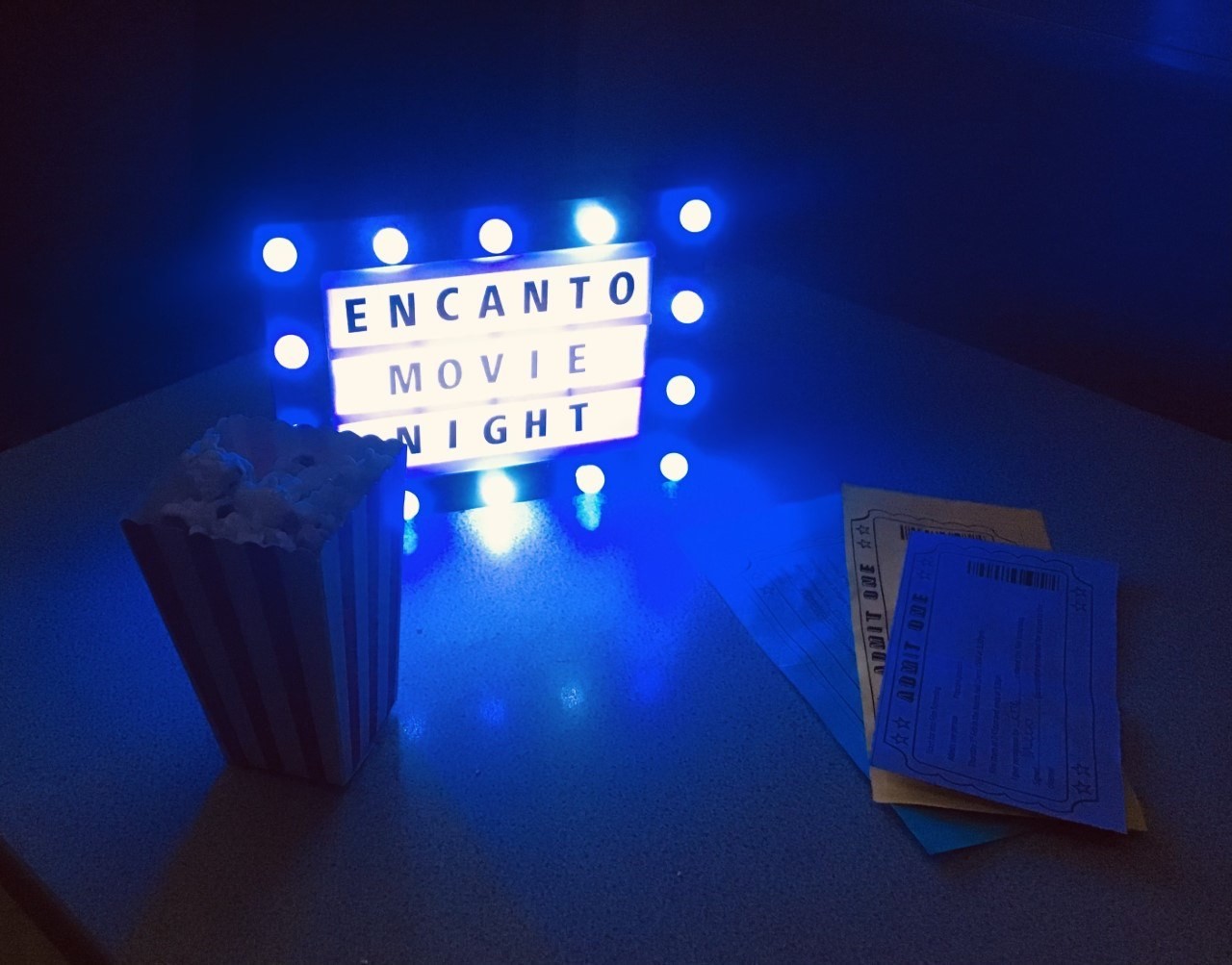
This month saw the opening of the Norris Hall Cinema for the very first Into Film Club Screening.
Along with Miss Durham, year 10 film studies students ran a film screening of Disney's Encanto for year 9 students.
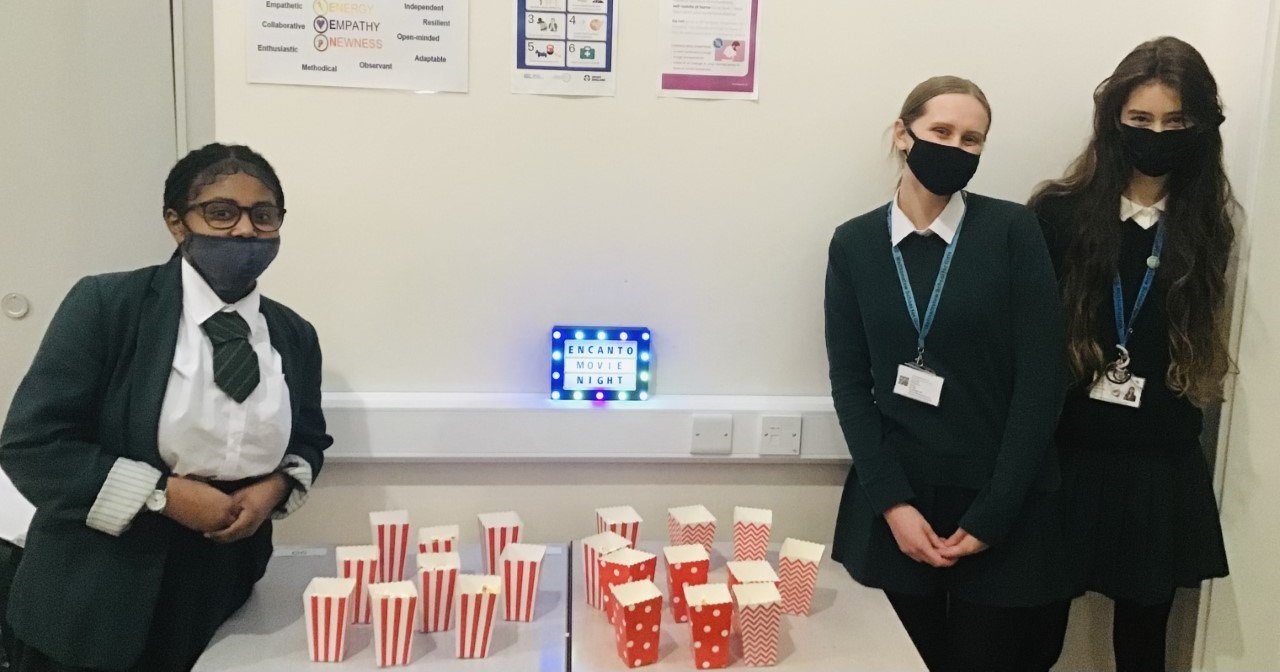
Stay tuned for film reviews and information on upcoming film screenings in the Norris Hall Cinema!
Ms Durham
English Faculty
English Community Corner

Introducing our new Community Corner feature to celebrate extraordinary people who do ordinary things.
This month, we are looking at articles by Megs 7G who spoke to a nurse with a wealth of experience and Maya 9H who interviewed a journalist and television presenter who can currently be seen on ITV.
An Interview with Anne Kennedy, Registered Nurse, by Megs 7G, GREEN Rep
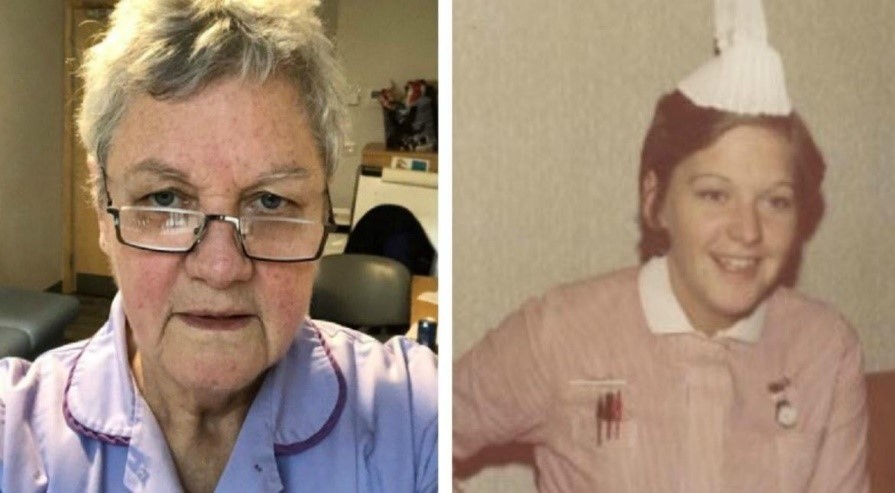
It was the end of an era on Tuesday as Anne Kennedy, 69, enjoyed her final day as a registered nurse at Bradford Royal Infirmary for 51 years. Originally from Essex, Anne’s dream was to become a brass band player - a job, in her words, that was hard to come by for women in the 60s.So, with the music on hold, she had to go down a different route and decided to follow in the footsteps of her mother. I decided to pick her as my Golden topic because she put her life on the line for so many years of HER life when she could've have done something else. Anne’s passion to look after ill children began at London’s Great Ormond Street Hospital in 1970.Once qualified, a move up North beckoned. She became a ward sister in the children’s department at St James’s Hospital in Leeds. In 1978, she moved across to Bradford working in the now redundant Children’s Hospital in Manningham.
A stint as senior sister and then nurse manager happened when the services moved to St Luke's. Anne stayed in West Yorkshire but transferred over to Dewsbury in 1990 where she spent 18 years as general manager. At 55, she had had enough of management and wanted to become a registered nurse once again so has spent her last 14 years on the children’s ward and as a Royal College of Nursing rep. It is this part of the job that she has enjoyed the most.
Anne said: “My passion for nursing grew and grew the minute I started. It has probably got stronger and stronger. I am proud of the profession and live it. That is why the last 14 years as a registered nurse has been the best. It is also about giving something back. "I had a strange job. I provided the nurses’ response to the staff side of work. Being able to support nurses has been an honour for me. My passion has been using what I have learnt to help nurses. One of the matrons asked me to go for a coffee and then every senior nurse turned up to say goodbye, it really surprised me. That was very emotional.
Anne will now spend her time with her grandchildren and rescue dog, Staffordshire Bull Terrier Sadie, at her Cleckheaton home. "I always said I wanted a needy dog. My grandchildren didn’t want an old one. “I hope she will keep me busy and fit. I absolutely adore her. "I took one on with behaviour problems. I am going to be trained up by some lovely people who are going to show me how to manage her.
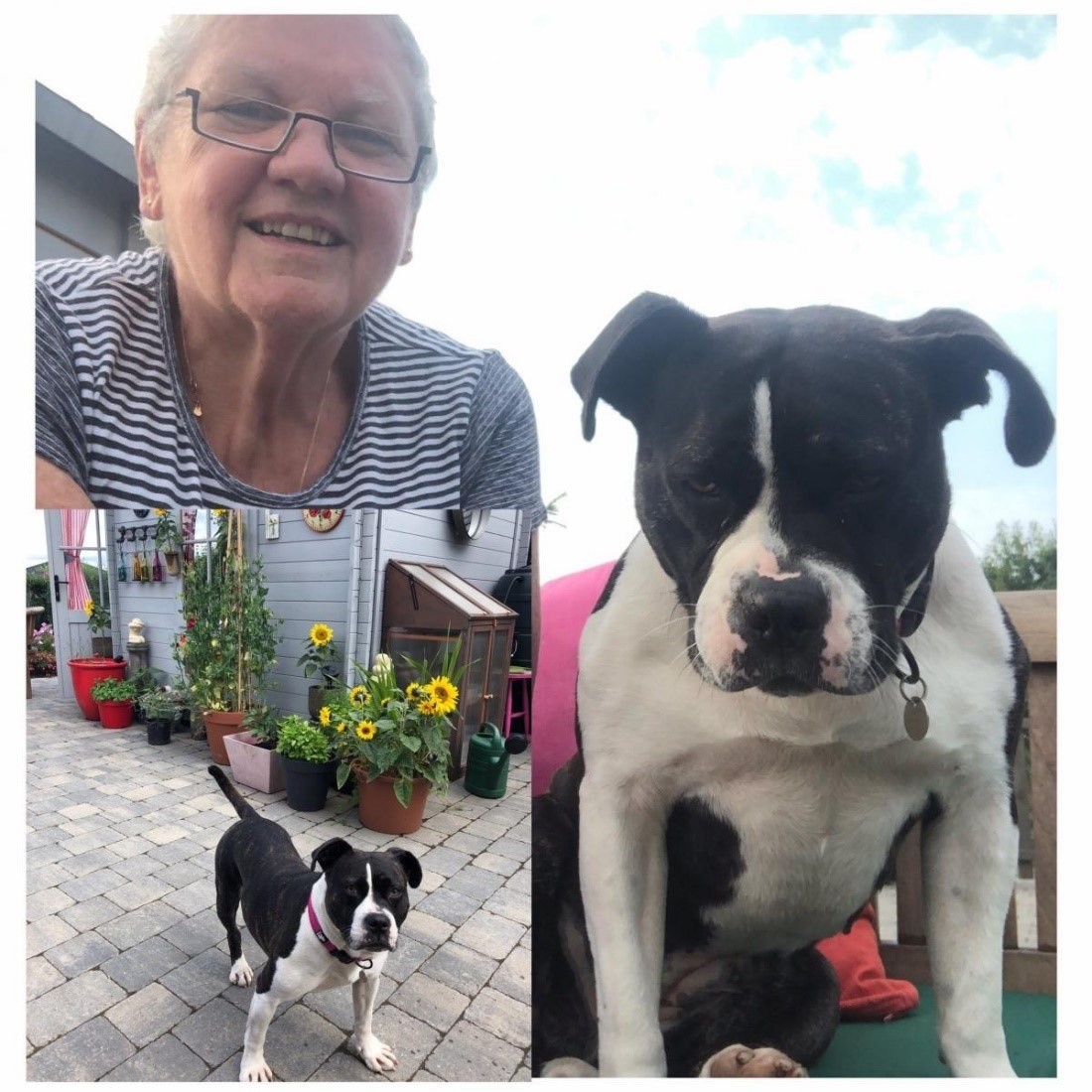
“Achieving High, Aspiring High” with Anushka Asthana, by Maya 9H
Anushka Asthana is a British journalist and television presenter. Since 2018, she has held multiple positions at The Guardian, including: the editor-at-large, the joint political editor as well as hosting the daily podcast; Today in Focus. Currently she holds the position of Deputy Political Editor at ITV as well as being a co-host on a political discussion series called Peston. Anushka was born in Lincolnshire, in 1980, and grew up in a small town in Greater Manchester. Her parents, both doctors moved to England from New Delhi, India in the 1970s. I interviewed her and focused my questions around her career in journalism and how racism might’ve affected it.
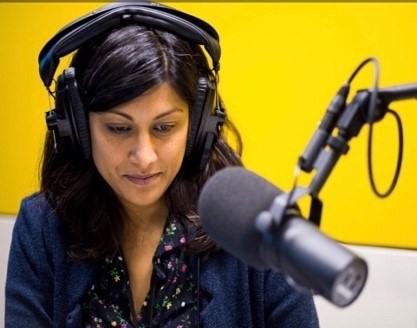
What got you interested in a career as a journalist?
“Actually, it was partly your mum. I wasn’t sure what I wanted to do, and I thought TV production might be interesting. So, I did loads of TV stuff at university and I worked on a student paper. Your mum said to me ‘if you want to be in this field you need to get work experience at a local paper’. So, I started applying to lots of different local newspapers until I got into on and then I got into another scheme and another scheme. And the more I did it the more I really, really loved it. I wasn’t a particularly confident writer and I realised that you don’t need to be to get into journalism.”
What did it feel like growing up in Manchester in the 1980s and 90s? Did you ever experience racism while you lived there?
“I did yeah, I had people say the P-word at me and I think that being a different colour meant that you were just treated differently in all circumstances. So, I think it affected your friendships, it affected how confident you might be. I mean that said, I had really, really good friends, I had a really good school and I didn’t particularly experience racism within that. But there was definitely racism in Manchester in the 1980s and especially in the area that I lived which was called Stalybridge.”
What was your first day like when you started your job as a journalist?
“My first day at The Observer, (it wasn’t really my first day as a journalist, but it was my first day in a national newspaper where I was going to end up working) was just after the government decided to go to war with Iraq. And The Observer had written an editorial in support of the war. My first day was going through all the letters, angry letters, coming in from readers who were furious that the paper had supported the decision to go to war saying that they were never going to read The Observer again, so it was quite an interesting day to go through all those letters. It was quite an interesting time because people were so upset and angry and fired up and it was a very toxic time for the government. But it was also kind of amazing to be there as well.”
Have you ever felt in your career that career has been impacted by racial bias and that you haven’t been treated the same as your white counterparts?
“I mean, clearly there is something wrong with how easy it is for people of colour to get up through the rungs of political journalism. You know, I know this because, the other day I had a mask on, and an old colleague didn’t recognise me because I was wearing a mask. I laughed and said how can you not recognise me I’m the only Asian woman here. That is the truth, so clearly there are big barriers of entry to people of colour in this field. I mean you can just see it everywhere you go. That being said, once you get in, as a woman of colour it’s almost not gone against me because I’m one of so few people in that position. And so often when people are looking who to employ, they want to have a bit more diversity, and I’m an obvious person to go to. But I do think like why is it that it’s so hard and so different for people of colour to get in. In every workplace I’ve ever worked in, I’ve always been part of a people of colour group and you hear similar stories. They come in and they struggle to climb up through the ranks and get to the top jobs.”
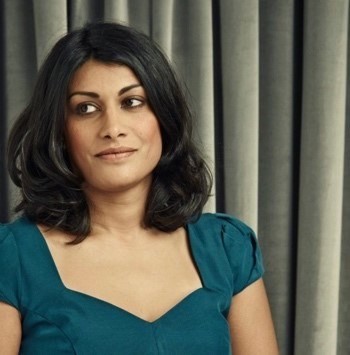
Tell me about meeting Barack Obama.
“That was really cool because at the time he was a senator when I was at The Washington Post. And they said would you go and interview this kind of cool, new senator who’s really up and coming. I didn’t know much about him. And even though it was two years before he became President, at that time people didn’t know that he was running. So I went but I was obviously really excited from the way I wrote, about it which was kind of this event where people were lined up around the block to try and see him. And he was really, really charismatic and interesting and inspiring, and I wrote about it afterwards. In the same trip I got to go on Air Force 1 and George W Bush was the President at the time so I’d seen him really close up. But in what I wrote about it afterwards I was much more excited to have met Barack Obama even though I didn’t realise then what he was going to be. But there is something very exciting about American Politics and when you travel on Air Force 1 it’s really, really fun. When you come off the plane, they block the roads and you run into this motorcade of cars in a line and it’s just another level. That position is the most powerful position in the world, and you can feel that when your reporting on it.”
If you could give your 13-year-old self, one piece of advice what would it be and why?
“That’s a good question, I think it would’ve probably been to relax and not worry so much about what people think of you and just be yourself and enjoy it because it’s a really exiting time. And you’ve got the world at your feet when you’re 13 and you can do anything you want and it’s an exiting time. I think that I worried too much about what everyone else thought when really it’s just to enjoy what you’ve got.”
Is there anything that in hindsight you would have done differently?
“In hindsight, you would be done loads of things differently. I think I’ve had an amazing, incredibly fun, exiting career. There have been forks in the road where I’ve gone one way, and for many years afterwards I wondered if it was the right thing to do, like the first time I left TV and went to The Guardian but eventually these things seem to work out. Eventually I ended up presenting a podcast called Today In Focus which was one of the best things I’ve ever done so I think it was the right thing to do at that time. But these things sort if stew in your mind for many years afterwards and I might pave been more confident when I was in America when I was in my 20s. And I might’ve applied for more foreign corresponding roles, but I’ve had a very good career and I’ve really enjoyed it.”
You went to went to an all girls school like me. Do you think this had any impact on your life and career?
“I’m a mum of all boys, and I feel differently about all boys’ schools. The one thing I think about all girls’ schools is, which is quite a good thing for us, was as a woman you could do anything you want and achieve anything you want. There was no like sciences for boys and home economics for girls: not that any school would do that explicitly, but I think it can be done subtly. And in an all girls school it’s not done because everyone’s a woman and I think there was a real culture of achieving high, aspiring high and maintaining friendships which I’ve still got now. Not only with people like Edyta but also with people who I was in a classroom with when I was 4. So, I think that’s all been really amazing, I mean I do think there are disadvantages to single sex schools, but I think as a girl there’s a lot you can get from it.”
One last question, what advice would you give to girls of colour around the world after knowing what you know now?
“I think the biggest thing that’s most helpful is to help each other. And I think it’s about being a woman and a woman of colour I think there are networks in every industry that you could work in. Networks that are trying to support each other and if you go into an industry you should find other women of colour and you should join their networks. You should support each other, and you should talk to each other about the barriers that you face, and you should work out how to get over them together. And if there are things that make you feel uneasy, or out of place, or things that you think are unfair about the way your being treated, then you will have that network there for you, to help you and support you.
Year 8 Short Story Author
A huge congratulations to Anna 8H who is now a published author!!!
A short story Anna wrote last year has been printed as part of the Writing Wizardry Anthology linked below.
As a school, we are all very proud of you Anna! 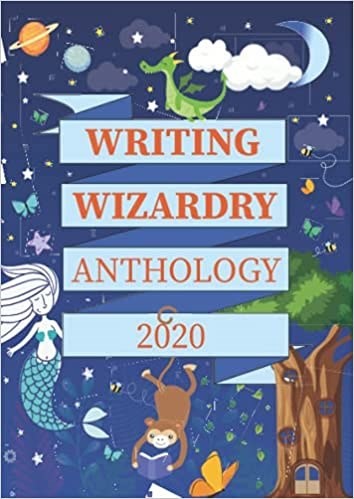
Mr Betts
8H Form Tutor
WW1 Poetry
Students in Year 8 have been looking at WW1 poetry, features, authors and the impact these have had over the years on readers. Students have also looked at WW1 art and how this can also relay powerful messages. I hope you will enjoy some of the work students have prepared in this respect.
Mrs R Jolliffe
English Faculty
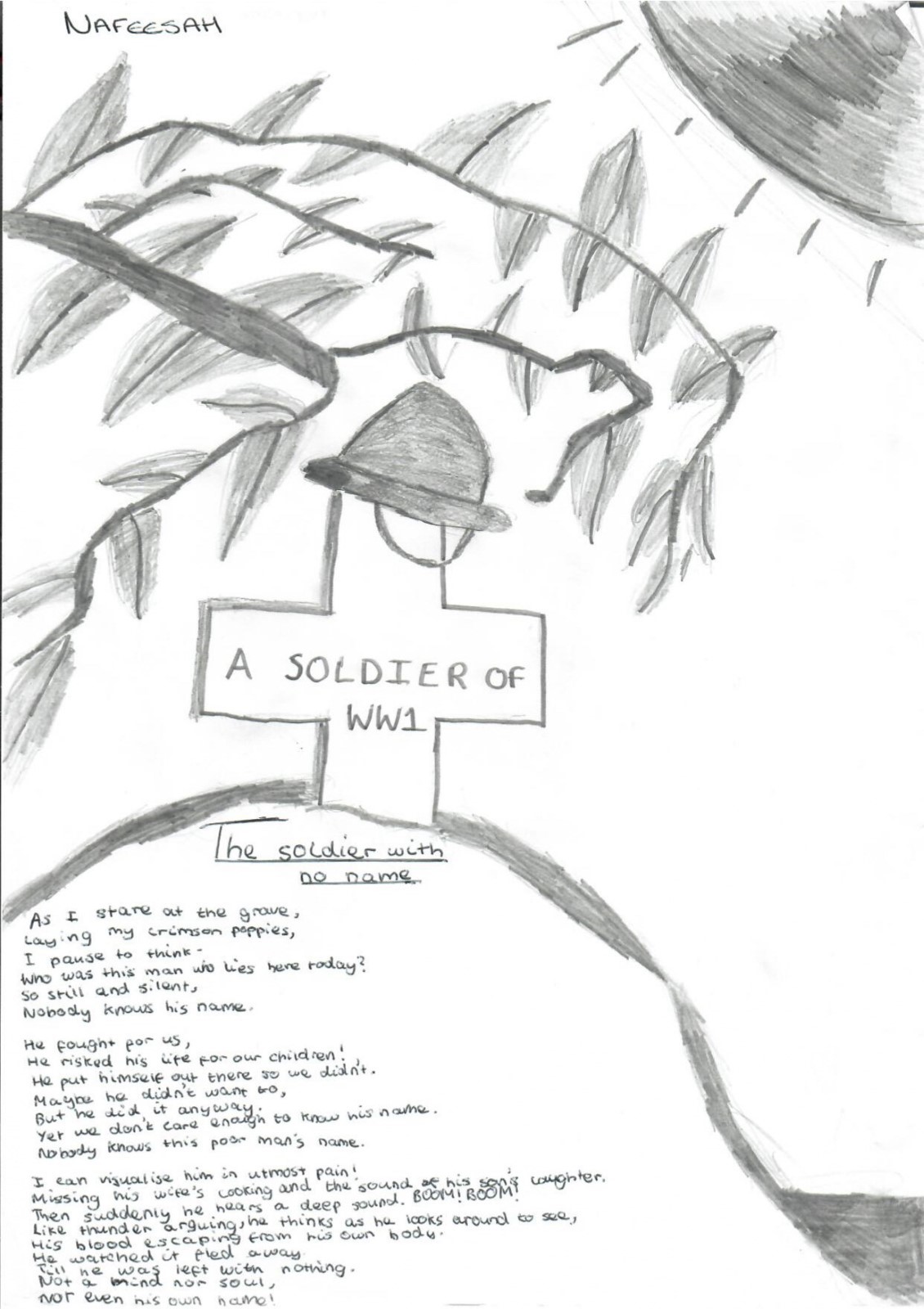
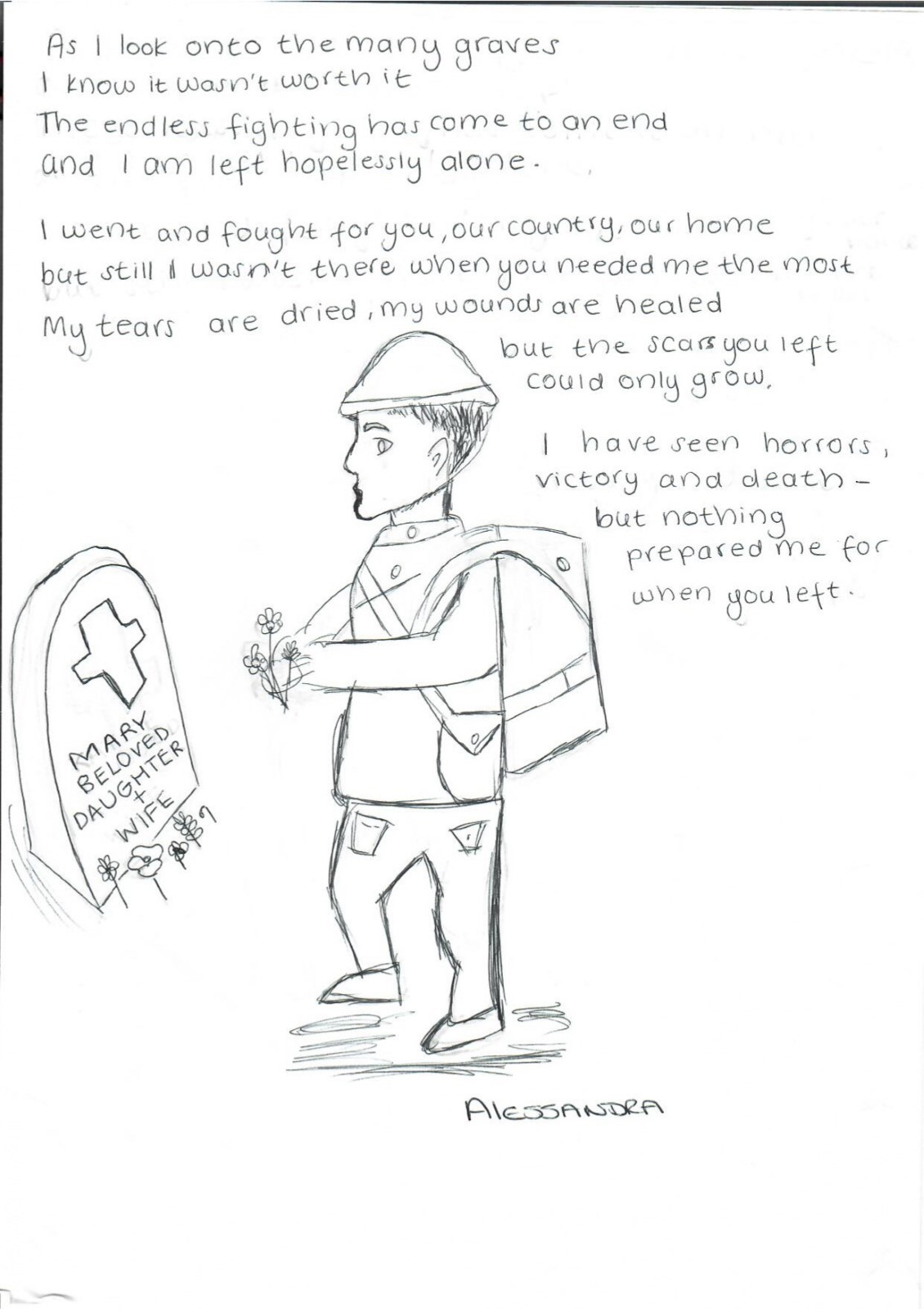
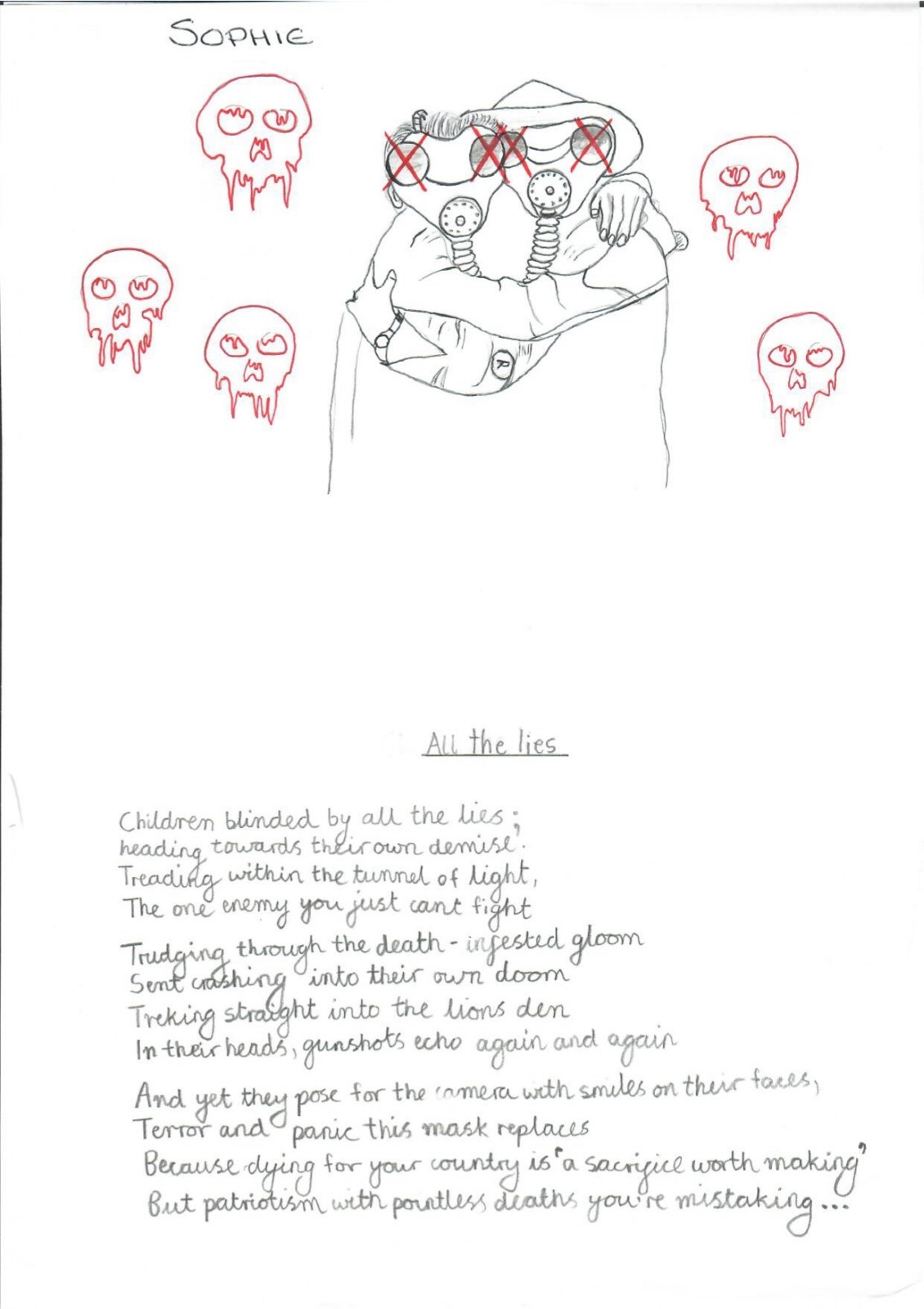
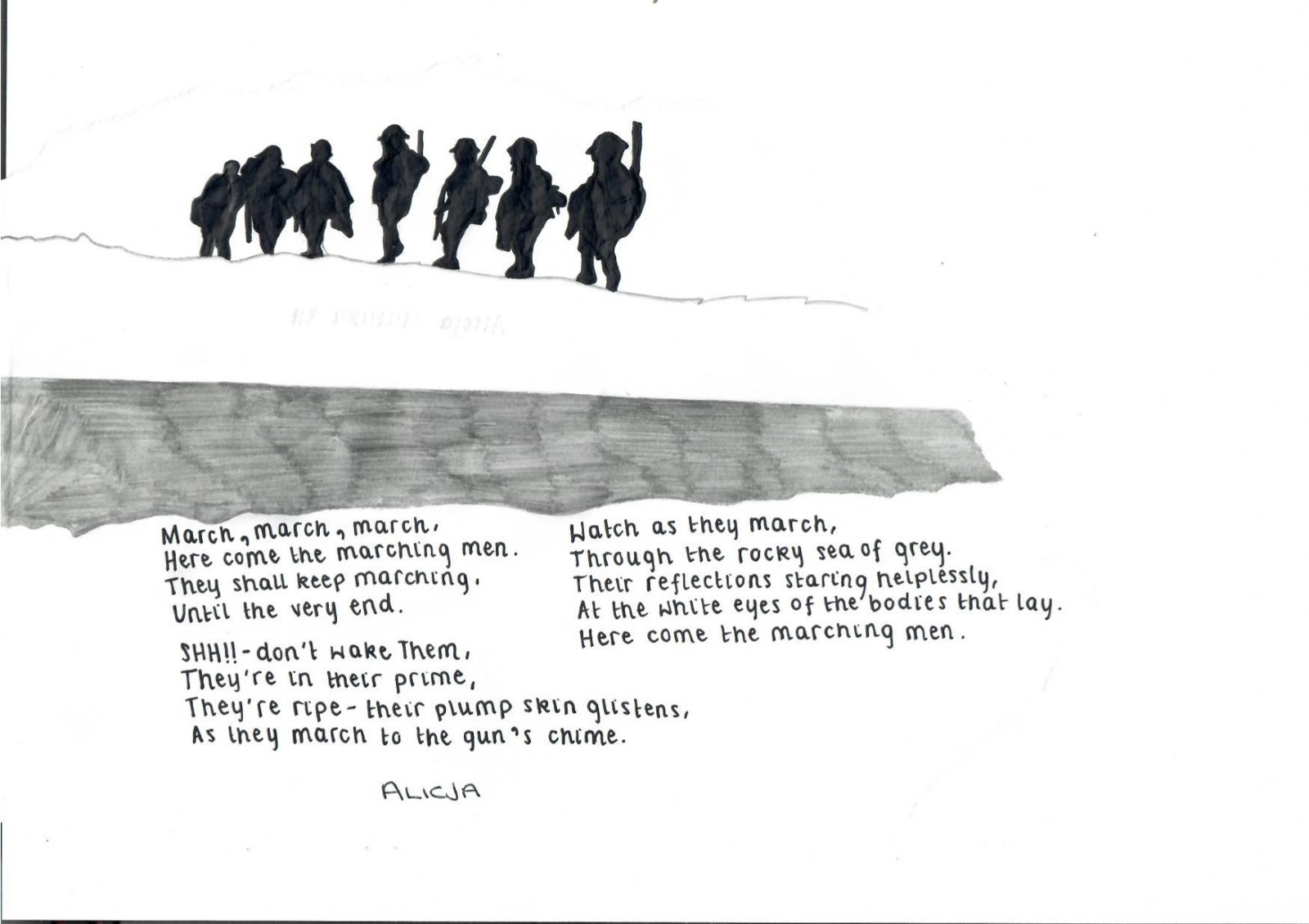
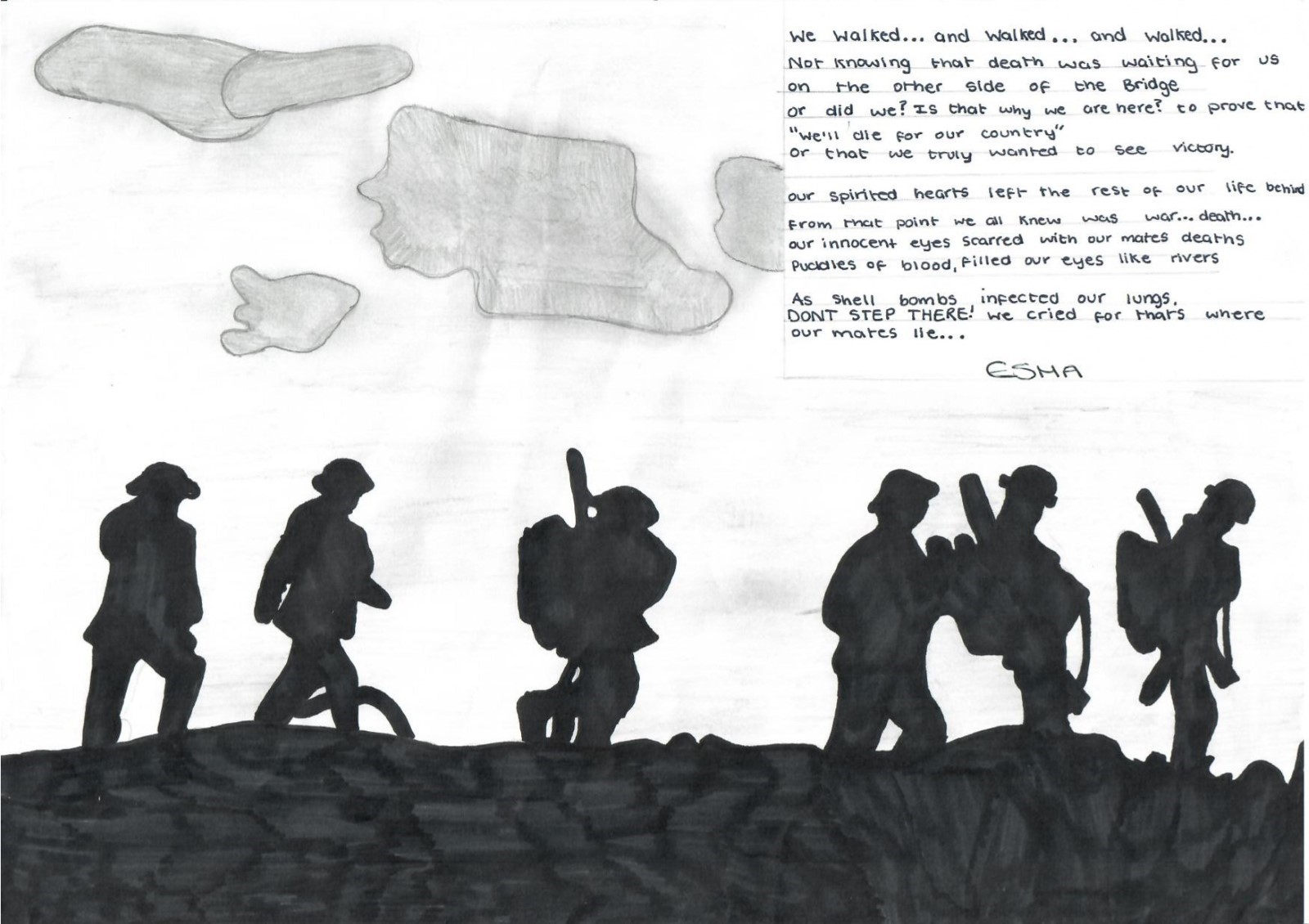
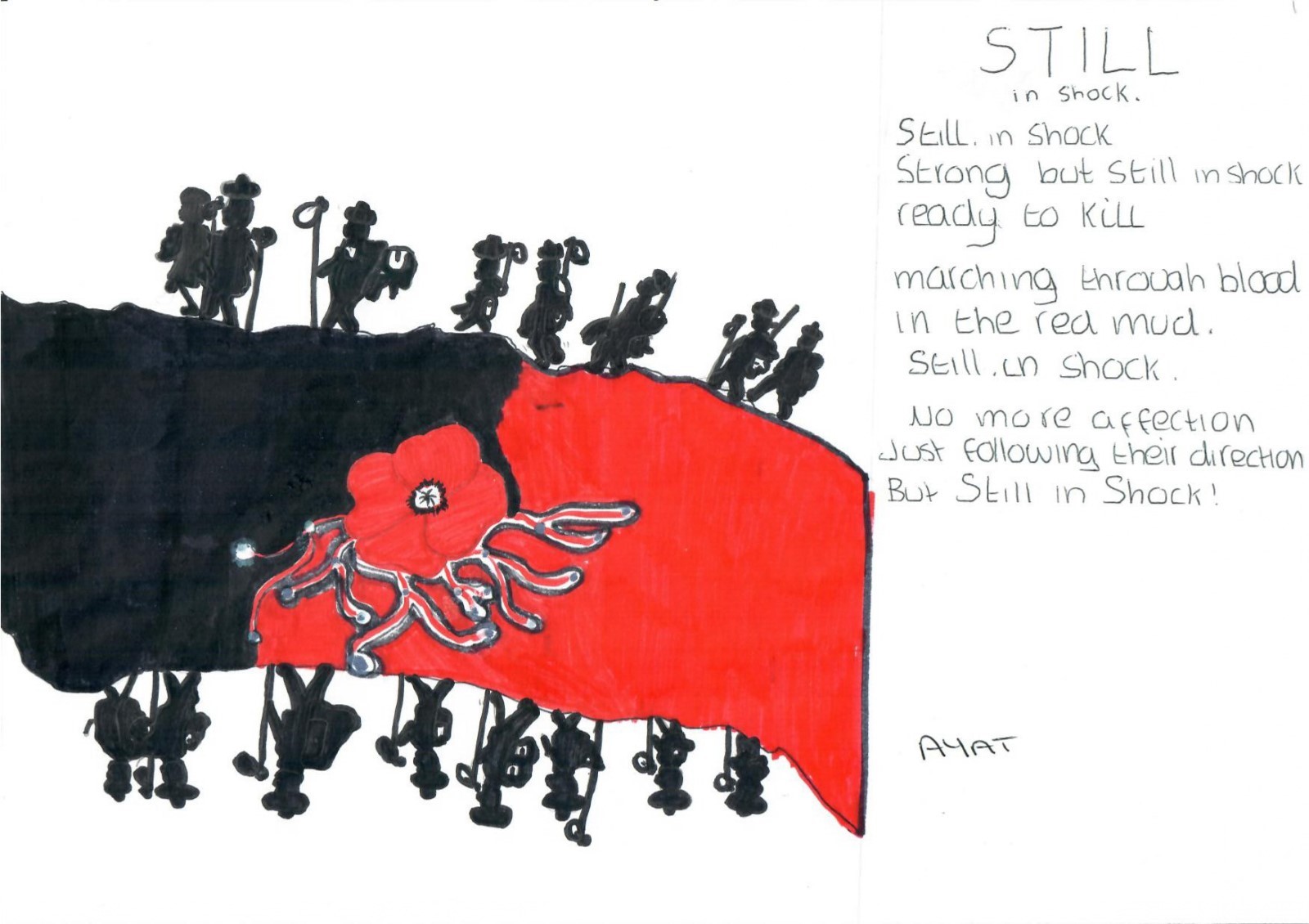
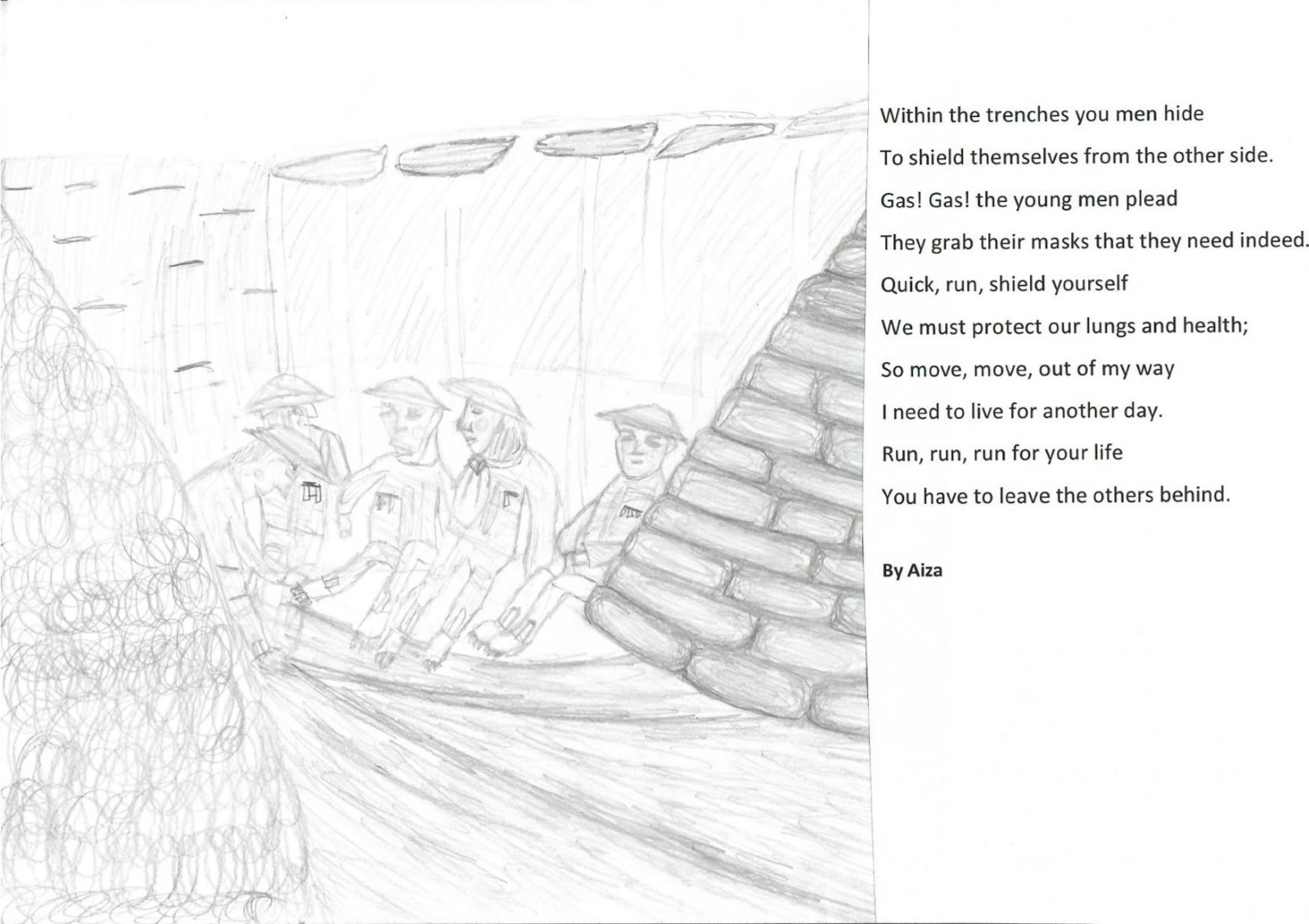
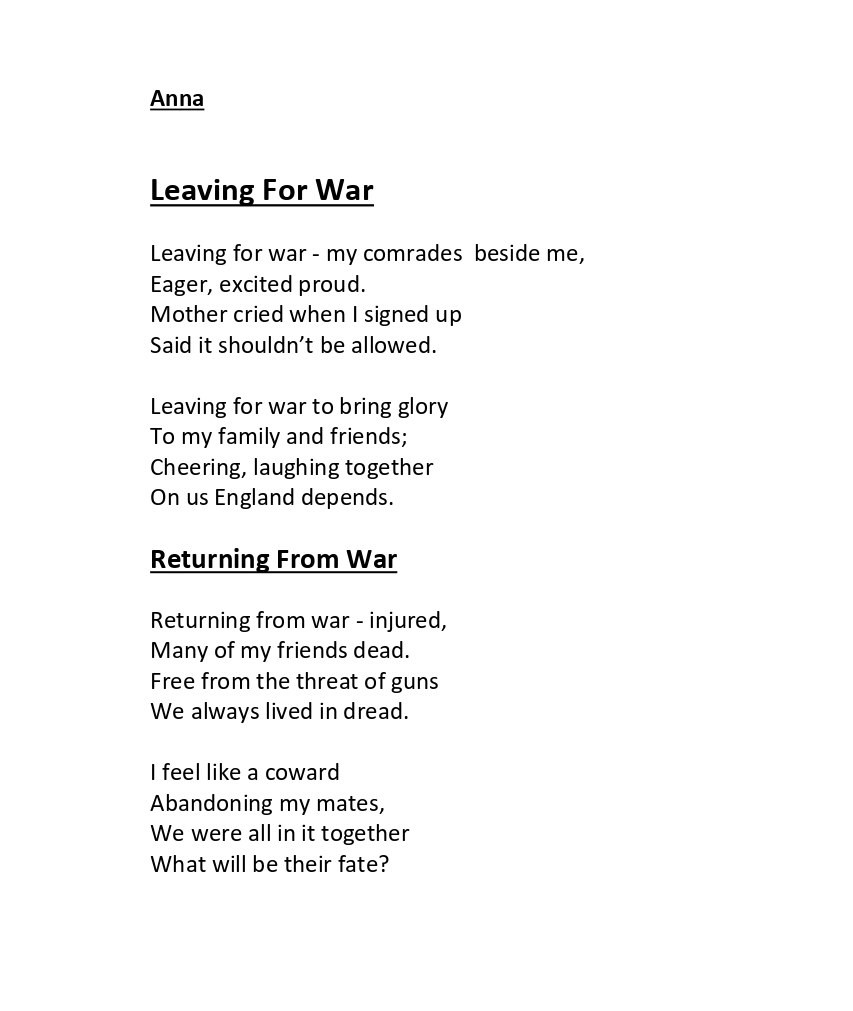
Refugee Week: Stories and Supper
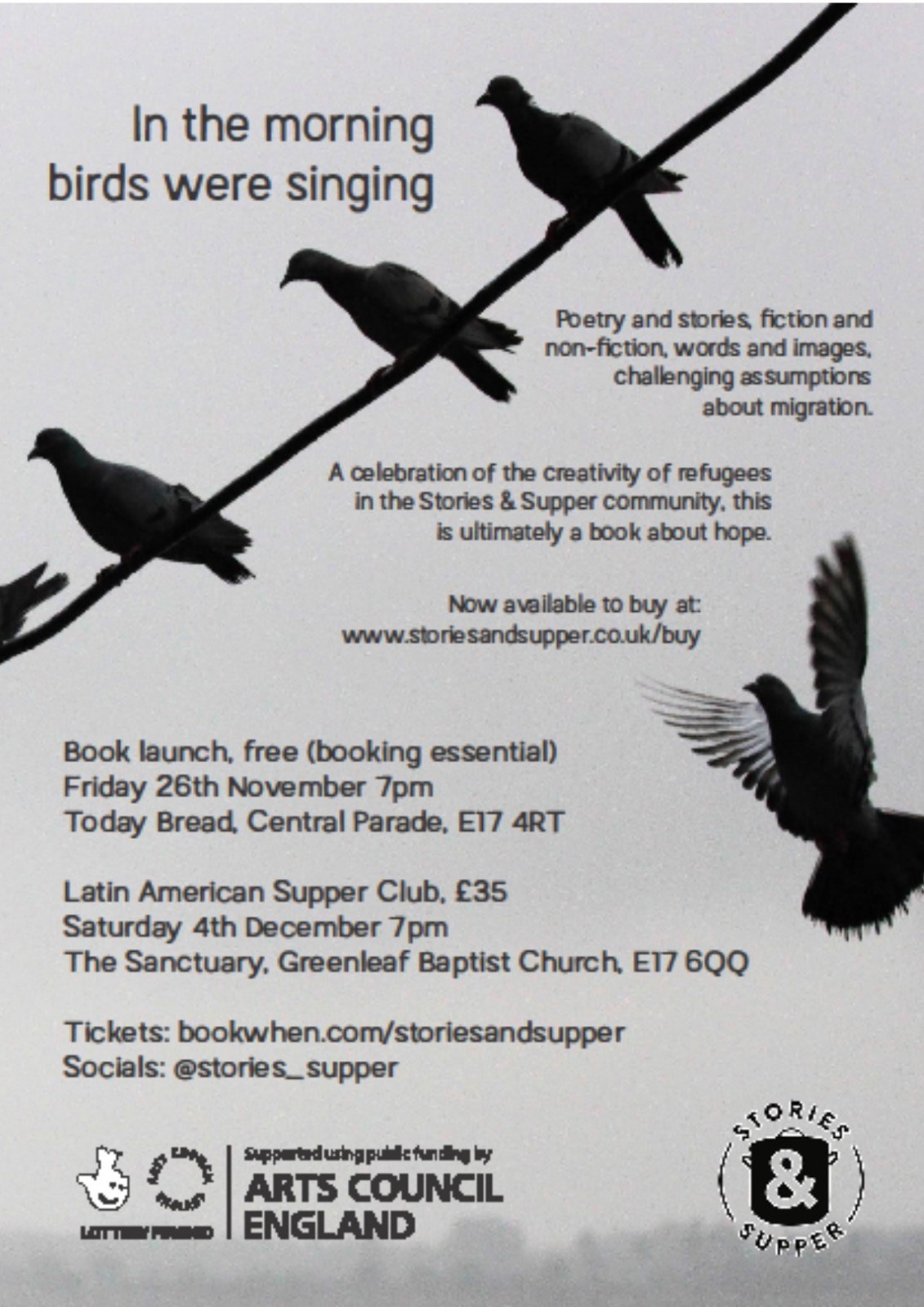

Last term as part of Refugee Week (14-20 June), a group of Year 7 students took part in a fantastic writing workshop with the 'Stories & Supper' team. Students learned about migration first-hand and wrote their own poems on the theme of 'Home.'
'Stories & Supper' team were so impressed with the students at all their school visits that they chose one poem from each school to publish in book. See flyer for further details on the book launch taking place on Friday 26th November.
To purchase a copy clink on the link: www.storiesandsupper.co.uk/buy
Ms Schaber
Associate Assistant Headteacher
Shaking Up Shakespeare
Romeo and Juliet
Earlier this month, the English faculty hosted a performance of 'Romeo and Juliet' by Shaking Up Shakespeare. All Year 11 students had the opportunity to watch, and participate in the performance.
A selection of 30 students were also selected by their English teachers to take part in an interactive workshop. It's always a fantastic event enjoyed by all, and the English faculty are very pleased to be able to host this event again!
Ms R Schaber
Head of English
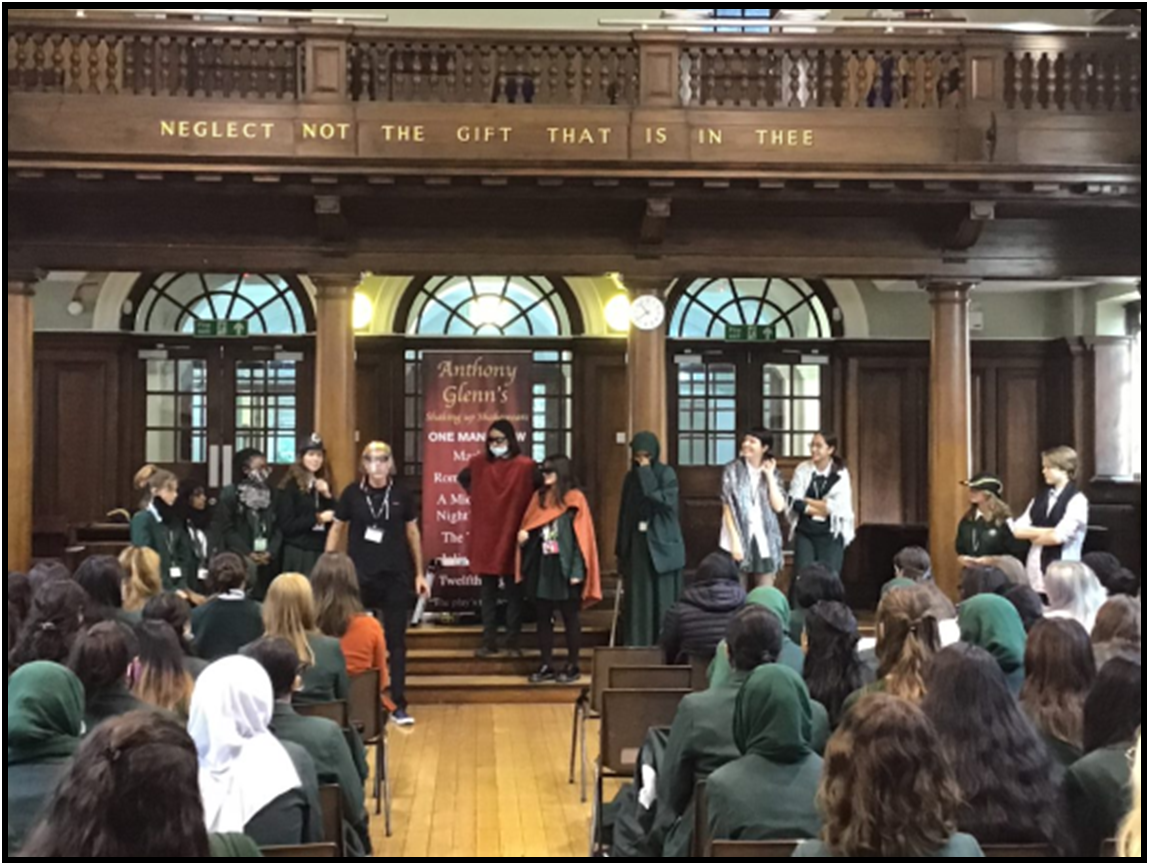
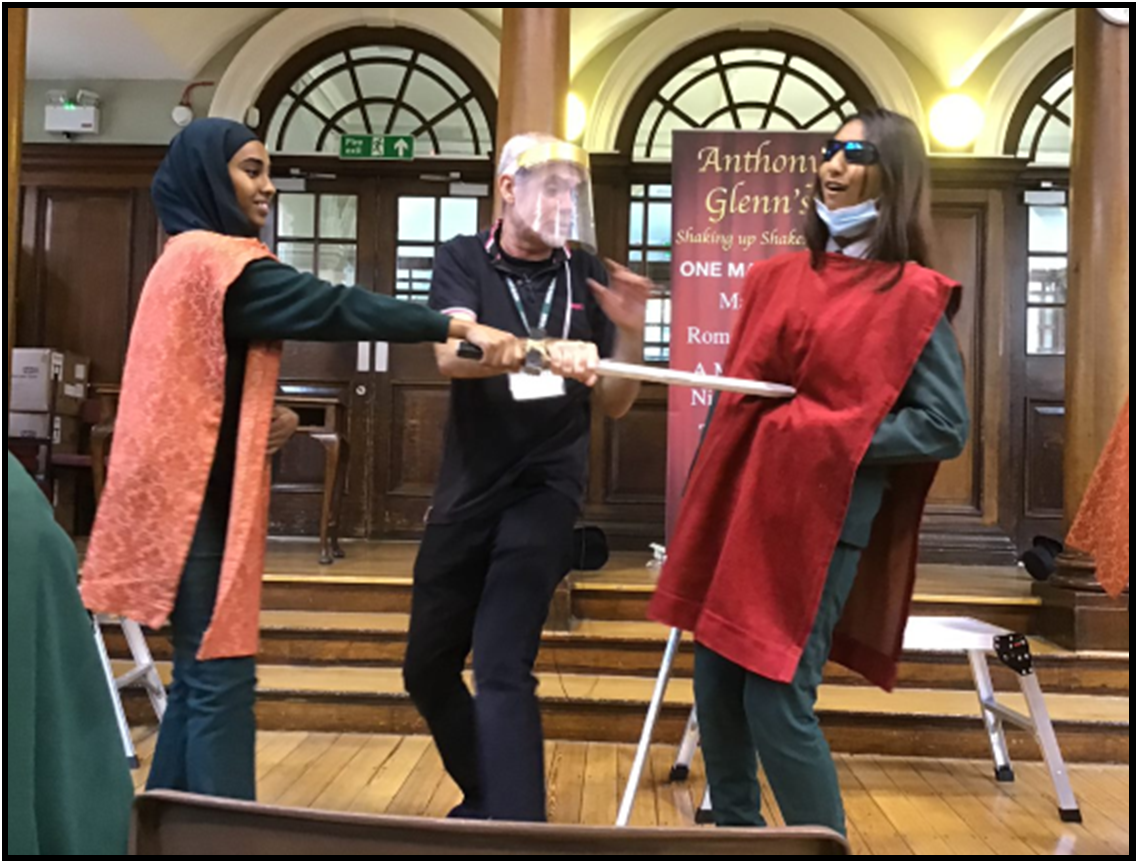
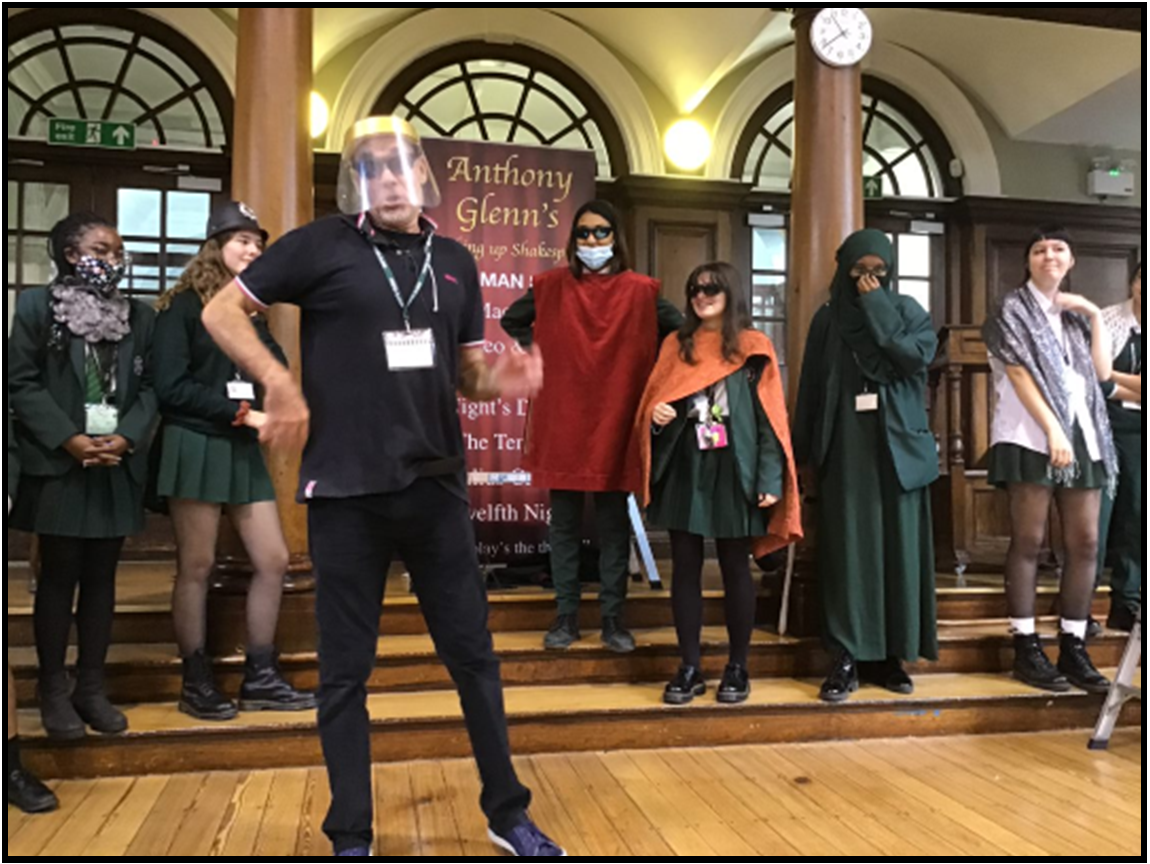
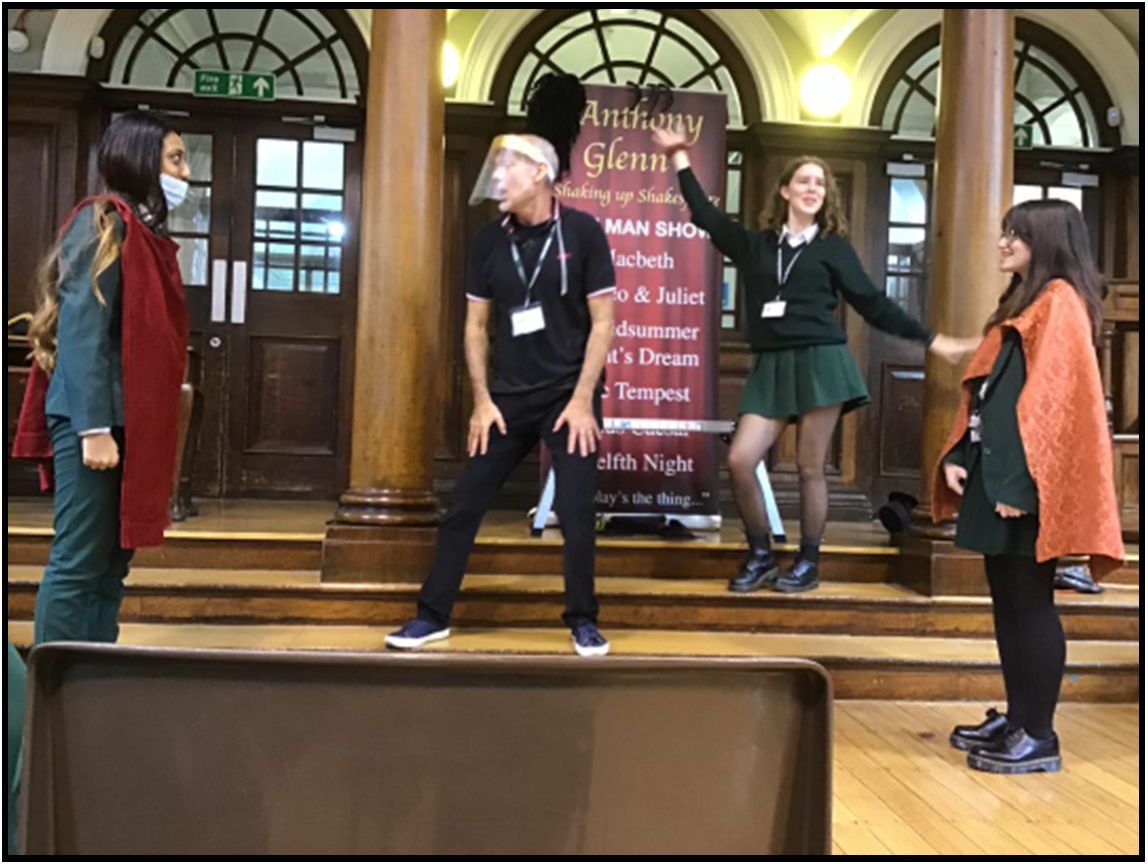
Black History Month
After a discussion about whether it is important to study diverse literature in GCSE English, a group of Year 10 students wrote short articles to give their views on the topic—please read them below:
Ms Cato
English Faculty
Should we study more diverse books? Elvin 10C
Diversity is important. The world is global and diverse books in schools would allow students to build understanding of diverse cultures and educate them, this is significant to demolish casual racism in school and wider racism in future generations. The lack of diversity means students cannot explore unfamiliar cultures through literature.
Also, people all around the globe are brought up in different circumstances and environments, this would mean that books and poetry written by people from different ethnic backgrounds would delve into different sides of society and could speak about topics relevant to them and their personal experience. This could be a good opportunity for students at youthful age to develop understanding. We need to instruct children about these things, to see change. If the school curriculums do not get varied, children will lack the understanding of the importance of embracing your culture.
Imagine a young child, in school, dreaming of becoming a writer but being put off when they see a lack of representation and therefore think that their ethnic background could prevent them from doing the things they love. This is what is happening to many students in the current generations. Not seeing people from your culture can be off-putting for many young people and in the same way we teach women in STEM and encourage girls to pick men dominated areas of study, we should also encourage children with diverse backgrounds by showing successful people from similar backgrounds.
I am sure many of my fellow students can agree on the points I have made and would be delighted to further expand on them. I know that I am not the only person that feels this way and change needs to come.
This could simply be one by changing some of the books and poetry on GCSE curriculum to be written by people from more diverse influences. Some books I have come across while research is- The Hate U Give by Angie Thomas, Americanah by Chimamanda Ngozi Adichie and A Little Life by Hanya Yanagihara. These are just a few examples of the books that could be incorporated into the syllabus.
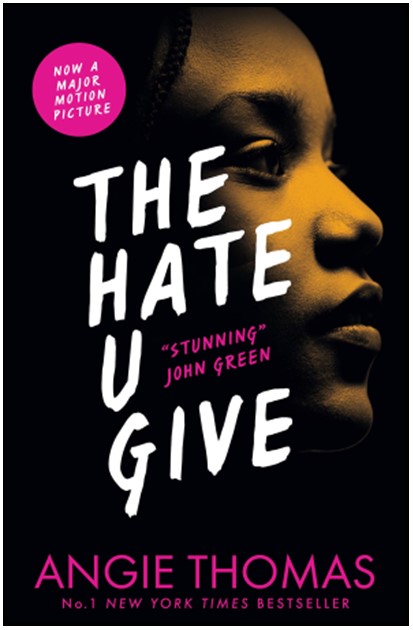
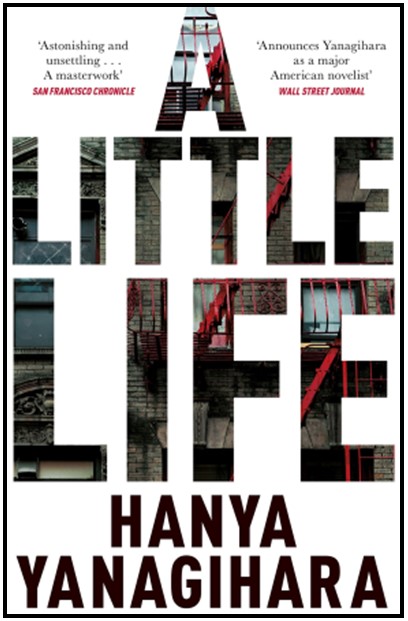
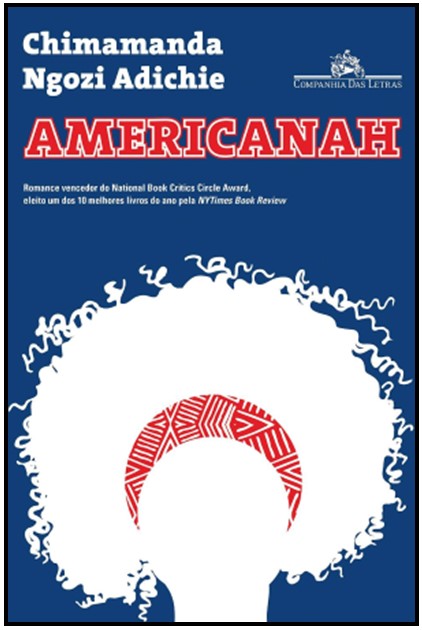
Should we study more diverse books? Zoe 10C
Yes. Yes! We should study more diverse books. It can develop understanding and tolerance that would otherwise be more prominent in our society if we stay in a little, sheltered ‘British’ bubble that some people are arguing for.
They say that if we are in Britain, we should study British books, by British authors. Britain is however a very diverse place and many people that live in Britain are from other countries as well. I, as well as many others, feel it is important that people feel well represented, whether in the media, in toys, in books or in the curriculum. There are lot and lots of non- white authors who talk about their experiences and their lives with Black and Asian characters, yet at the moment there are only white authors in the curriculum with white characters or when there are Black characters, they are negatively represented. The world is now a more global place, so it makes sense to read books that give insight into the lives and thoughts of people from a variety of cultures and countries.
I am currently reading ‘The Color Purple’ by Alice Walker as part of the school’s Global Book Club. The book follows a young black woman named Celie living in America in the early to mid 1900’s. The book is a brutally honest tale of what life was like for Celie and how normalized abuse was all throughout her life. The book makes the reader very aware of how tough the lives of many young black women were at that time and through history. The way the book is written makes you feel very emotionally connected with the character and you feel immensely proud of how she develops strength having gone through so much.
Alice walker herself is a very inspirational woman- she is a novelist, a poet and an activist winning the Pulitzer Prize for Fiction in 1982 for her novel ‘The Color Purple’, making her the first African-American woman to win the award. Studying books like hers will build understanding and tolerance in the lives of everyone.
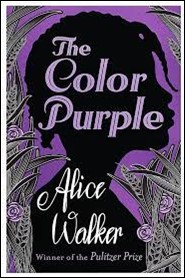
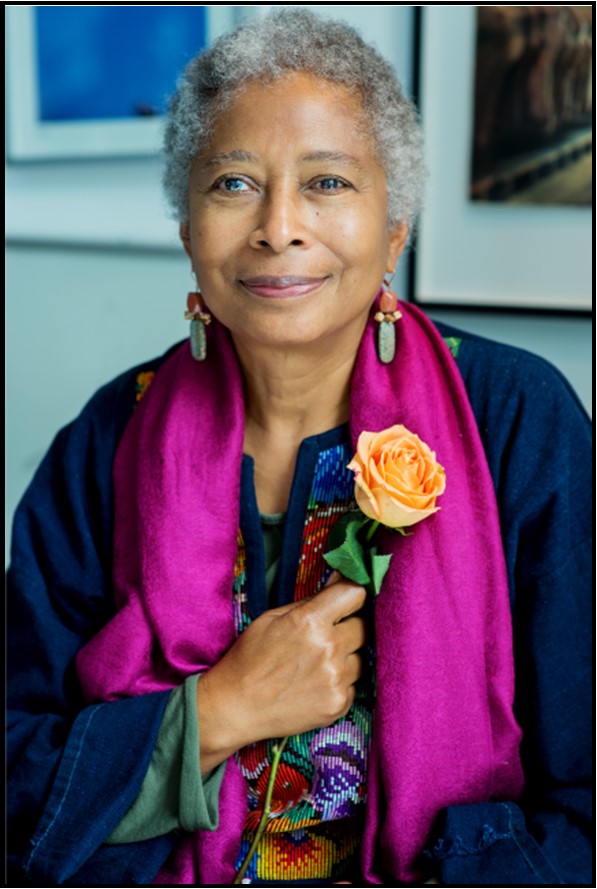
Should we study more diverse books? Sara 10H
Diversity matters because we need to see outside our own little world to make a difference in this life on a small and large scale.
Diverse books are incredibly important, especially for us students, who are looking to see their own lives reflected in literature to know they are not alone, and to introduce new thoughts and ideas so they know there is so much more to our beautiful world. Diverse books are important for a way to walk in another's shoes, and learn about another's world and experiences.
They are a chance to see things from a perspective you may never encounter, in a place you may never go, and live in a culture you may never experience. They help cultivate compassion, awareness, and understanding. They are a safe place to learn, love, and explore.
We can find ourselves in books, learn more about ourselves, and find our better selves that we aspire to be, often reflected in a character we identify with. They teach us the kind of friends we want (and can be the link to finding them), good and bad ways of dealing with conflicts, and give us new things to think about in the way we view people and the world. Chimamanda Adiche wrote the book ‘We Should All Be Feminists’. Chimamanda Adiche's strongly believed that females we should be feminists not only as a commitment to women's liberation but also as a way of encouraging men to hold conversations with women on sexuality, appearance, roles, and success. Being a feminist entails championing for the rights of women and trying to make the world a better place for women.
Themes of ‘We Should All be Feminists’: feminism, power, gender, gender expectations, coming-of-age, money, injustice, equality, masculinity, femininity, boys and girls, society, culture, tradition, society, socialisation, roles, ambition, shame.
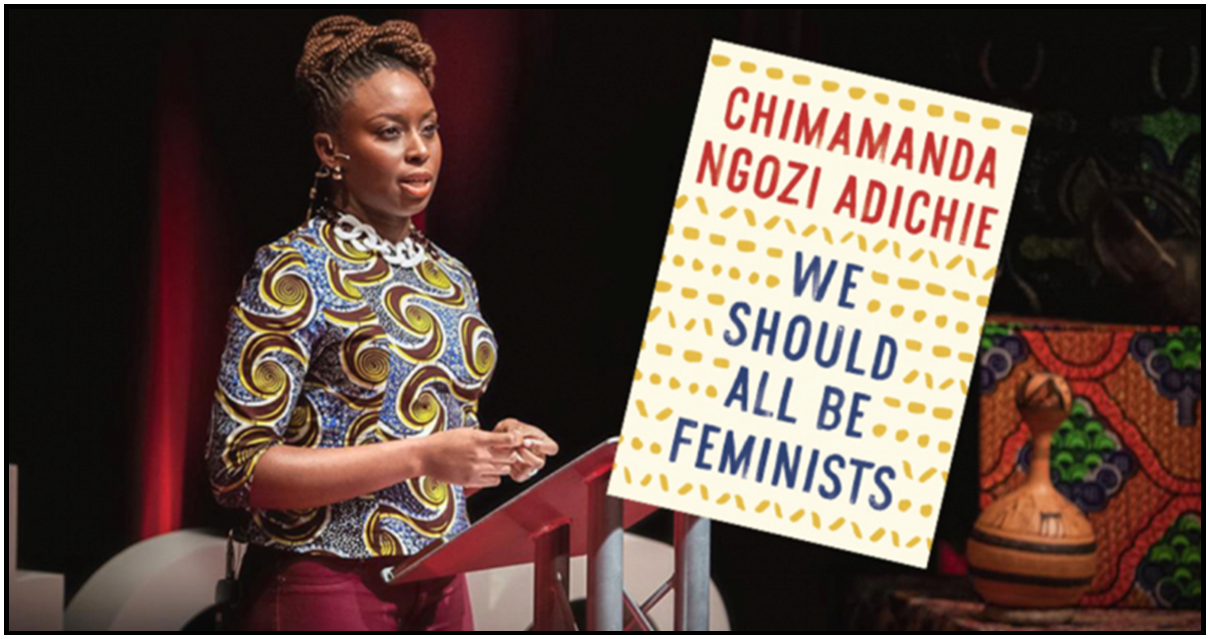
Year 8 Public Speaking Grand Finalist Winner
In the last half of the summer term, Year 8 students worked on a public speaking unit in English. Each student chose a topic they felt passionate about and researched, drafted, and performed a speech to their peers. Our Year 8 students produced some fantastic speeches, showing off their hard work, research, and excellent speech delivery!
The Grand Final of our Year 8 Public Speaking Competition took place on Monday 19th July. All of the judges were extremely impressed by the standard of speeches given by all six of our finalists, who showed great maturity and passion for the subjects they chose.
We are delighted to announce that Faith 8W is our Public Speaking Grand Finalist this year. Well done Faith!
Please see a copy of Faith's winning speech reprinted below:
The dangers of critical race theory and the single-story people tell
Everyone's a storyteller. I am. You are. We all are! I'm a storyteller and I'd like to tell you some stories:
Imagine you're at the back of the classroom. Oh, no! The history teacher comes in going:
‘Hey...everyone we’re going to be learning about slavery in Africa and the slave trade! Whaddya think?' Now, I bet you’re thinking why Africa? Why? Well, I'll tell you why. Because Africa is one of the continents caught up in the single story. Just the other day me and my family were at the airport when I heard:
‘We are proud of charity work done in India, Africa and other countries.’
I mean, there are others too, like, Africans are people waiting for a person with no colour to get them out of their ‘failed infrastructure’. I'm not saying that’s not true but it's the one story! What in the world happen to the others?
How come the British Empire is taught in all its glory but not also shamed for the killings and homicides it caused? how come Islamic people are related to
terrorism? And how come, in America, white liberals see black people as those who cannot use the internet, but most black teenagers own a phone! These are all examples of the single story. They dehumanize and bring down the rights as low as they can and make sure to throw the charger away! This can affect how people earn jobs and live their lives in general. Think about it. do you just buy into the
single story? I mean, everyone’s a victim... and a predator. You say Germany, you think of Hitler. Think of all those innocent Germans who weren’t born before 1939.
That’s what it does! Critical race theory - the stereotypes that ‘pressure’ people into judging others because of their skin, traditions etc. It's like when one person from the community does something wrong, the whole gathering gets the blame! Someone tell me if this is fair? No, it isn’t but people judge others by their one story but don’t have time to read the rest!
This is a quote from Chiamanda Ngozi Adichie, a Nigerian feminist:
‘The single story creates stereotypes, and the problem with stereotypes is not that they are untrue but incomplete. They make one story, the only story.’
Ms Schaber
Head of English
Stories and Supper Poetry Publication
As you may remember, a group of our Year 7 students took part in a fantastic writing workshop with the 'Stories & Supper' team in June. Students learned about migration first-hand and wrote their own poems about the theme of 'Home.'
We are delighted to announce that Flo in 7W has been selected to have their poem published by the Stories & Supper team! This is a fantastic achievement, and we are so proud of Flo's hard work. Please see Flo's poem reprinted below:
I Come From...
I come from… rumbling tubes, shivering bodies and flawed design.
The Jubilee Line is filled with unspoken words and jumbled memories.
The railroad cries echo in my head.
Strangers whisper at a glance,
frowning faces and emotions hidden behind masks.
I come from… blooming magnolia trees and blossoming flowers
ripe with colour and taste. My mother cared for it
as though it were a child. A seed into a sapling
a sapling to a mighty oak.
I come from… concrete giants, their faces turned from
the piercing sun. The cracks in the pavement gaping open and swallowing me whole.
Culture bursting from every open door, open arms
and glistening smiles.
Fireworks illuminating the dark night sky.
I come from…. a Tesco’s down the road, a school across town and
a loving family at heart. Friends who cradle me
when I’m down, make me laugh and save me
when I can’t find the light. They are that
light.
I come from… a mother, a father, a cruel sister, a sweet cat,
a strange grandfather. A safe haven.
My home is wherever I feel safe and welcome.
Imaginative Poetry
Year 7 students have been focusing on poetry last term. We had an Imaginative Poetry lesson and one of the students - Anna in 7H produced this. Why not have a go yourselves? It's not as easy as you might think. You MUST follow the pattern!
Mrs Jolliffe
English Faculty
Ten brave suffragettes
marching in a line,
One dropped her banner
And then there were nineNine brave suffragettes
chained to a gate
One got arrested
And then there were eightEight brave suffragettes
walking to Devon,
One fell in a pond
And then there were sevenSeven brave suffragettes
thinking up tricks
One went to give a speech
And then there were sixSix brave suffragettes
very much alive
Emily D was killed by a horse
And then there were fiveFive brave suffragettes
running from the law,
One went on hunger strike
And then there were fourFour brave suffragettes
happy and free,
One was sent to jail
And then there were threeThree brave suffragettes
using glue,
They left one stuck to a statue
And then where twoTwo brave suffragettes
on the run,
One hurt her foot
Now there is oneOne brave suffragette
Her work nearly done
Then women got the vote
And now there are noneAnna, 7H
Romeo and Juliet Wordsearch
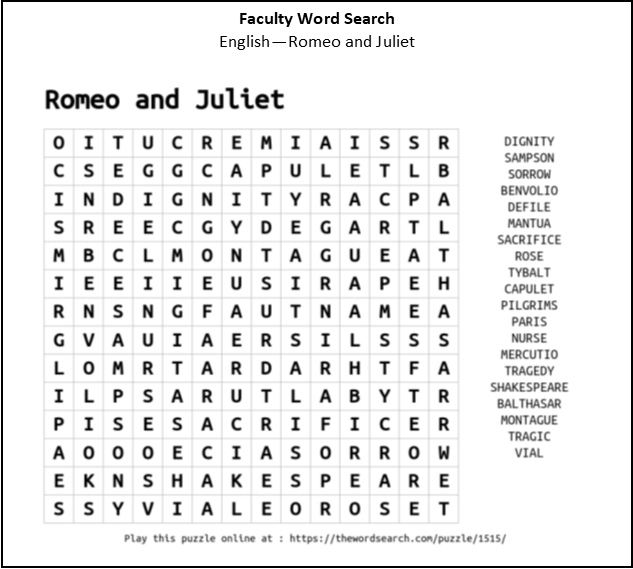
The Tempest
Shakespeare's Comedy - The Tempest
Students in 8H have been working through Shakespeare's comedy, The Tempest.
They were challenged with producing a poster for present day people to encourage them to take an interest in this play. Here are some of the wonderful results:
Mrs Jolliffe
English Faculty
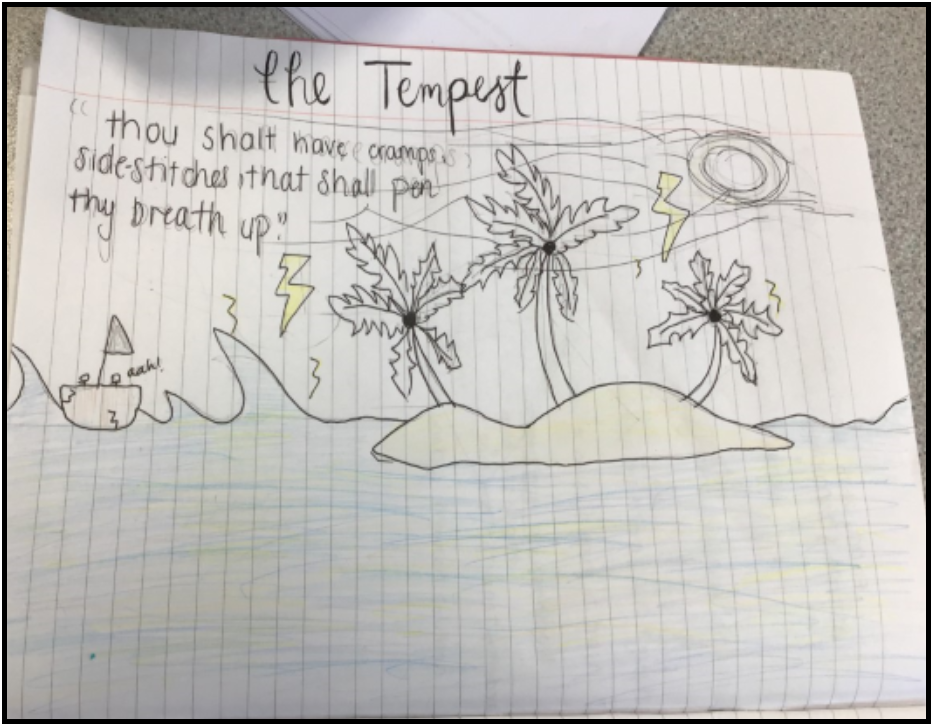
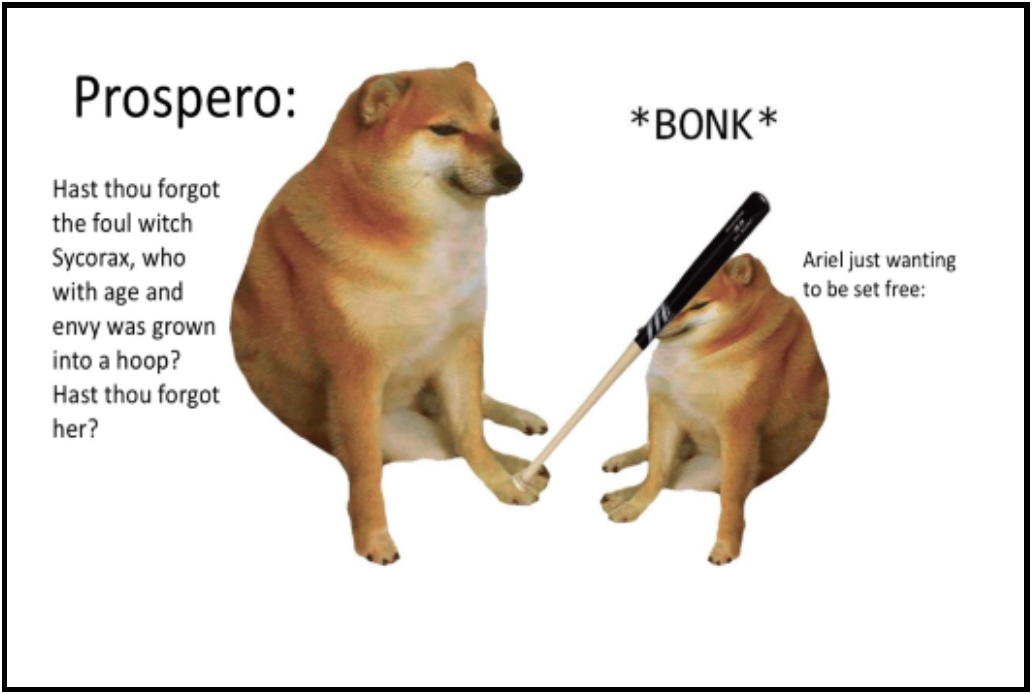

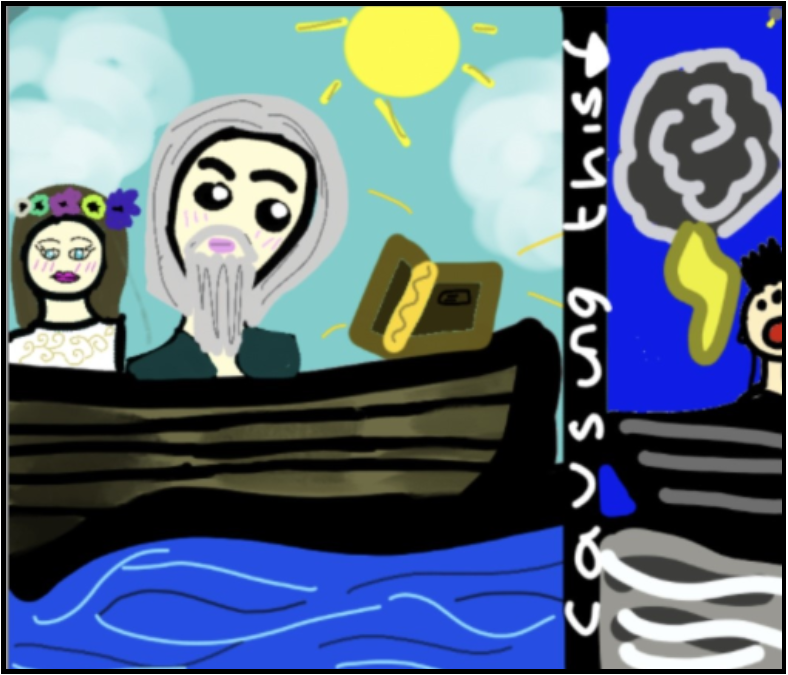
English Wordsearch
Words supplied by the English Faculty based on the book Animal Farm.
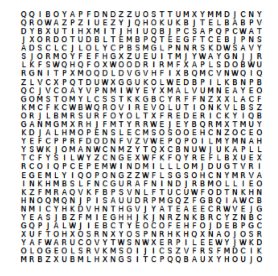

English Faculty News, Spring 2019
This half term the English faculty have been busy celebrating a variety of events and competitions. Year 9 have been following the ‘Up for Debate’ scheme of work which develops oracy and provides thought-provoking and challenging motions for pupils to debate. In addition to interesting and informative debates within lessons, the English Faculty is also pleased to announce that the following students have made it to the Year 9 debating final at WSFG: Jessica, Rachel, Beatrix, Amanta, Saahirah, and Keira. These students debated in an assembly before half term, the motion they were proposing or opposing was: ‘This house would allow performance-enhancing drugs in sport.’
Technology is advancing so rapidly and it has changed the way we educate our young people. At WSFG this half term 7F have been trialling iPads in their English lessons and have been using them to explore non-fiction texts. They have embraced project based learning and have been busy working collaboratively to plan and create their own digital magazines! The completion deadline was Friday 15th February and Ms Simpson is looking forward to presenting the magazines to parents and carers once completed.
In addition to exciting lessons, Year 11 students had the opportunity to attend a Jane Eyre lecture delivered by Professor Dasgupta of Oxford University. The lecture explored key themes in the novel and allowed students to delve into alternative interpretations of their GCSE text. Many students felt inspired by the lecture’s content and felt encouraged at the prospect of one day attending such a prestigious university.
Furthermore, the English faculty is also pleased to celebrate our students’ success beyond the classroom. Students have been invited to submit their entries to the Young Writers competition ‘Poetry Escape’. This competition inspires students to express themselves through poetry and voice their opinions, to break down barriers, destroy stereotypes and liberate their creativity. We have seen impressive entries and hope that someone from WSFG wins the competition.
Our Young Reporters have been busy writing for the yearlong scheme and have published an array of insightful and stimulating articles about local issues.
Most recently we have seen Ying Hang discuss the minimum age for voting, Crystal considering the importance of Holocaust Memorial Day, Kitty examining fitness in the UK, Iris celebrating Walthamstow hosting some of the London Borough of Culture celebrations and Safa reviewing a West End musical!
The articles written by our students are available on This is Local London.
Ms Simpson
Up for Debate Competition 2019
The winners of the Year 9 Up for Debate Competition 2019
"This House would allow performing enhancing drugs in professional sports."
The Opposition team!
Amanta 9S, Saahirah 9F, Keira 9F
A big thank you to all of Year 9 for being the perfect audience, and well done to all of the finalists.
The English Faculty
Young Reporter Scheme
Congratulations to the following Year 10 students who have applied to the Young Reporter Scheme and have been accepted
Gabriela
Safa
Ying Hang
Iris
Gulfen
Kitty
Amud
Crystal
We looking forward to reading your published articles over the next eight months - Well done!


